#Application Analysis
Text
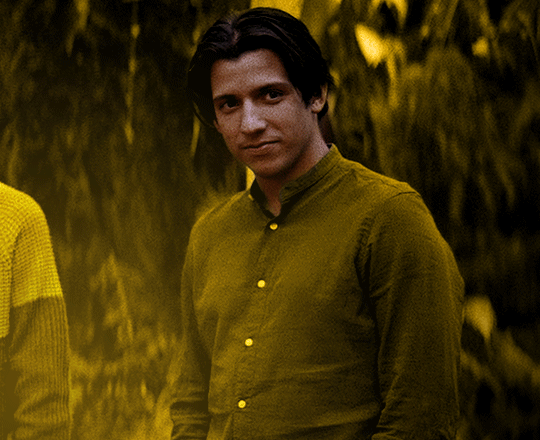

"I think everyone’s first impression of Travis when they saw him on screen, people got an emotionless guy who doesn’t care about anyone and can’t show human emotion. And I was super happy when those were the comments coming out, even though it seemed negative, because that’s exactly what seemed important to me was this guy is going to hold it to his chest, any sort of emotion he has, and you’re barely ever going to see him give you a glimmer of it. I thought about when I was that age, and then I thought about the time period on top of that, and when I was that age, I already didn’t want to give people anything that felt like someone could come back at me with. It’s that protective, 'I don’t want to give someone something they’re going to use against me.'"
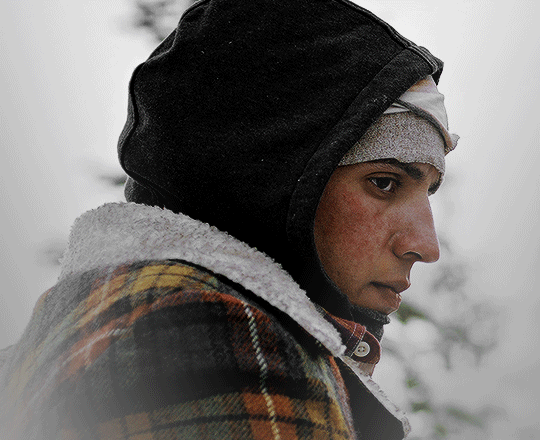

"So Travis has those walls built up, but on top of that, the way that he creates those walls is different than mine, where in 1996, it would be misogynistic comments coming at you, attacking you, rather than quiet. It’s not just quiet. He retaliates. That was really important, and the writing is what gave me that. As an actor, it’s our job to justify and figure out why. Why a writer put this in, why is this here, why is it important. That’s how I tried to build how he created his walls. I just read the script and went, ‘Where do they see him? Where is he on the spectrum of hiding himself?’ And I tried to draw from myself, but also from the writing, but also from the time period. It was really just a balance, because even as the episodes go, the writers allowed for Travis to have moments that changed the way that he was perceived and how much he gave people and how much he emoted. I’m glad the negative qualities came out in the sense that he does have toxic behavior that he throws out there quite often."
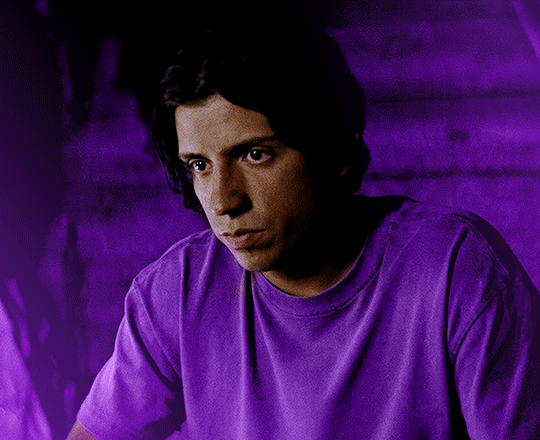

“It was a big point to me when I was trying to play Travis; none of these people really talked to him before this. There’s gotta be a really reserved quality, a defense mechanism quality to him because these people never cared about a single thing he said, but now all of a sudden they’re expecting him to act how they want him to act, so there’s a defense, there’s an anger in that. That was something I really wanted to explore. His anger, we definitely explore.”
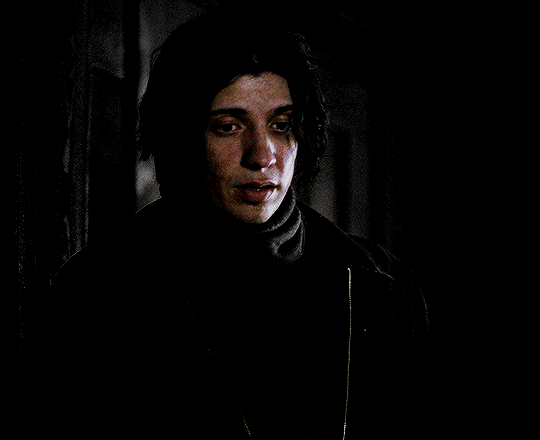

lgbtq meme: (3/5) headcanon lgbtq+ characters
— nonbinary TRAVIS MARTINEZ
ft. Kevin Alves interview with Yellowjackets Buzz

#travis martinez#travismartinezedit#lgbtqmeme#yellowjackets#yellowjacketsedit#yjedit#tvedit#yellowjacketsnetwork#*#usercoty#tusermich#userbecca#tuserdee#tusermiles#ughmerlin#usercleo#tuserjes#userclara#thank you yj for your gender analysis of travis martinez#to my bestie evan this one is especially for you#also more applicable interview quotes to use but i just love this one so much so hi
165 notes
·
View notes
Text


#green cards#civil rights attorney#visa denial#u.s. immigration#ms-13 suspicion#gang tattoos#tattoo misidentification#el salvador immigration#immigrant rights#wrongful visa denial#family separation#immigration expert testimony#los angeles attorney#visa appeal#immigrant discrimination#u.s. immigration policy#no criminal record#gang affiliation accusation#tattoo expert analysis#immigrant advocacy#visa application process
199 notes
·
View notes
Text

Let this be a living example that knowing the beliefs of any individual who wrote any piece of text- be it literature, articles, or posts- can and should drastically alter your perception on what the text is actually communicating, even if that knowledge has, on its face, changed none of the actual printed words. This is how application of real-world context works, and this is how it applies to any recorded medium.
It reminds me heavily of a quote from video essayist Jacob Geller, regarding the 1938 film Olympia- "It's different when Nazis do it".
Olympia is a film that, on its face, simply depicts an artistic documentation of the 1936 Berlin Olympics. But within the context of its production taking place during the Nazi regime, with its director being a well known Nazi propagandist... The way the movie fixates on the power and elegance of the human form and Ancient Greek statues quickly shifts from being completely innocuous appreciation to the worship of what is perceived as the ideal forms of the "Aryan race". Suddenly, you understand the movie not to be a pretty inoffensive documentation of a historical event, but a propaganda piece.
Understanding the time period in which something was made, as well as the setting it was produced in/for, and whatever ideologies an artist may hold and experiences they've had is absolutely critical to getting a full understanding of anyone's work. There are some things that are near completely anodyne on their face, but the revelation of what the author thinks and feels about other people and the world around them totally redefines every word on the page.
This image is such a prime example of why context matters. This opinion, laid bare, stripped of context, is both inoffensive and nonsensical. No one's ever thought it to be lame to create your own nickname... But on its own, that's a harmless kind of wrong.
... But with the addition of them being marked as Anti-Trans (red) on Shinigami Eyes, a browser extension dedicated to crowdsourcing keeping track of Trans Friendly and Transphobic creators... Suddenly, "Nicknames" doesn't mean "Nicknames" anymore. Suddenly, you realize that "Nicknames" is code for "Chosen Names of Trans People". Suddenly this isn't about thinking choosing your own nickname is lame, this is about thinking that trans people shouldn't have the right to name themselves. Suddenly it's about invalidating identities, thinking they're worth mocking. Thinking that people who identify as trans are "just trying to be cool", and that they're not actually what they say they are, because you don't get to choose your gender nickname, that's something already decided for you.
Suddenly, you realize, it's not about "being lame".
It's about Transphobic Violence.
This is why you cannot ignore when an artist, author, essayist, developer, musician- so on and so forth- is bigoted. This is why you can't ignore the context behind their upbringing. This is why you can't ignore the context behind their lived experience, their ideals, their goals, their message. Yes, it may appear innocent on its face. Yes, it may look fine stripped from the context of it being written by an inevitably flawed human being. But what's really being said here? What do those words mean... To the one who wrote them?
Context redefines Text.
Even if the words didn't change.
#this post is a bit random. not apologizing. it was just such a perfect encapsulation#i am still tagging this as homestuck because this is ultimately EXACTLY how i feel about hussie + their works. you must understand this.#its so applicable to hussie + homestuck + analysis of homestuck that it is fucking painful. PLEASE understand this. PLEASEEEE#homestuck#homestuck meta#homestuck analysis#andrew hussie#context#literary analysis#essay writing#cw nazi#cw transphobia#nekro.pdf#nekro.txt
1K notes
·
View notes
Text
tonight i was thinking about orv’s theme about how yjh as a character, and to a larger extent people, will in some ways always be unknowable. (orv spoilers following, read at your own risk)
i feel like i’ve seen a few posts on here that somewhat take this theme to an extreme, leaning *hard* into that “kdj doesn’t actually know yjh like at all” which while on the right track, i feel completely misses the point. Orv goes out of its way to showcase that kdj actually understands yjh to a scary degree, even once they’re out of the early scenarios and the gap between kdj’s knowledge and yjh’s personhood grows larger, there are still things about yjh that *only* kdj can fundamentally understand. And I don’t think that the novel does anything to discredit that understanding, only says that there is much more to yjh. In the same manner, even if you’ve known someone for years, spent all your time with them, there can and will always be new things for you to learn about them. The danger that orv speaks of is trusting in that assumption, that your understanding will be enough and you don’t have to keep an eye out for more developments. That the person you know will forever stay the same. And this isn’t a kdj problem either, fundamentally a lot of the big disagreements that happen between kdj and yjh in the latter half of the novel are born from both of them misconstruing what the other is thinking, trusting that their understanding of the other is deep enough to base their judgements off of. (Post first murim destruction, divorce arc, yjh thinking kdj scattered his soul on purpose, etc.)
As always with orv’s themes, we can view it in a meta sense as well. Kdj’s understanding of yjh as a character is so complete that it’s nearly flawless- until the story begins to deviate and a yjh grows outside the parameters that kdj’s judgements are based on. Even before then, there was always more to yjh- but as readers, we can only understand a character as much as we see them. What you come away with from a story is your complete understanding, there is no growth outside of those boundaries because then it wouldn’t be an understanding of *that* character, you would be putting your own ideas and such into it. But talk to another person, and suddenly the same character you understand so clearly becomes someone else. Talk to the author, and they say something completely different. And can one truly claim to understand a character when the story will never talk about them in every conceivable way? What does it take to truly understand such a thing? Learning that 1863rd round hsy wrote ways of survival with such limited resources and knowledge on who yjh even is, and yet despite it all, still manages to write a story that captures so much of his essence. As orv readers, we know it isn’t everything- it could never encapsulate all of yjh, but the idea that even when one knows nearly nothing, you can still put on a facade of understanding.
We can get into a chicken or the egg argument with this, as 1863!hsy dictates how yjh acts with her writing, and that yjh in the 1863rd round is the one she comes to know before ever starting this story, but when it comes to this theme of the unknowable in the people around us, I don’t think this sort of debate is worth much. We know that yjh exists outside the story written, and how much of him is determined by hsy’s writing is negligible because no matter what, he always grows beyond it. Whether as 1864 or secretive plotter, it all comes back to that same point of there is always more to see within a person.
I don’t know quite where I want to go with this, only that I wanted an outlet for some of these thoughts inside my head, but one of the best things about this theme for me is how it answers itself. When the people around you become unrecognizable, what should you do? And orv says to reach out. To try. To understand. Kdj loses access to omniscient reader several times but always, always gains it back in orv (as far as i remember), because at the end of the day, he is not someone who stays trapped in his idea of who he knows yjh to be. Yjh too, even at the end of orv, is trying to learn more and more about kdj. Only when you are willing to hear out the other person, to learn about them every day, does this unknowable aspect become something less daunting.
#orv#omniscient reader#omniscient readers viewpoint#kim dokja#yoo joonghyuk#joongdok#meta#analysis#it just kinda ended up kdj and yjh focused because this is what the theme is most applicable too#i wish i had more thoughts on how 1863 wrote WoS bc that definitely fits in here more than what i said about it#i think too it can be applied to ysa and kdj#while not as relevant as it is with yjh since their relationship doesnt stretch back as far#they still spend so much of this novel learning more and more about each other#compared to back at minosoft where at least to me it looked like they already had an idea of who the other was as a person#so sorry if this is disjointed i need to stop writing meta as 3 am#in my defense its the only time my thoughts come out like this#on the verge of sleep#orv spoilers#omniscient reader spoilers#i forgot them early on my bad
606 notes
·
View notes
Text
god i fucking hate how much the homestuck fandom waters down characters. hussie did such an amazing job at giving us a collection of multifaceted and nuance-rich characters to really become invested in, and so much of the fandom insists on molding them into a one-dimensional husk of themselves that only reflects the traits they can use to fulfill a trope of some sort, especially female characters. and so often this leads to people horribly misunderstanding so much of the story due to blinding themselves to why somebody could be doing something, either demonizing or angelicizing characters that are actually morally grey, or even the opposite alignment of what the fandom assigned them. this is represented perfectly in the "which troll was the worst" argument, where people almost always respond with gamzee, eridan, or vriska. while I don't believe any of the three were entirely innocent, i don't believe any of them were entirely in the wrong, either. for gamzee, so many of the things people point to in order to make their argument of him being awful or irredeemable were while he wasn't fully capable of properly vetting his decisions, e.g. sopor withdrawal. eridan is definitely less defendable than gamzee, as all of his actions were done in his right mind, but we do have to step back and look at the bigger picture. not only was he a young teenager living under a series of extremely traumatic events, he had lived his whole life having violence drilled into his head because of the lifestyle he had to live and the influence he took from Dualscar. i feel like these factors more heavily influenced his personality, and eventually his violent outburst, more than people give him credit for. after all, i feel like it's obvious that he would've turned out significantly less bitter and violent if he had been raised with more nurture. especially since feferi, a troll of a caste even more known for violence than eridan's, was significantly kinder. vriska, by far the most controversial of the three, was at least partially a product of spidermom's influence. she had no choice but to feed her lusus, of course, so what choice did she have but to become accustom to murder? coupled with the fact that manipulativeness is a trait her caste is nearly universally predisposed to, we can't have expected much from her in terms of kindness to others. now, none of this is to say any of these characters are entirely innocent, they most certainly are not. their flaws are obvious to anyone who's read the comic, so i won't touch them, but labeling any of them as simply "guilty" or "innocent" is a harsh disrespect to hussie's ability to create characters with depth and humanity. no one troll is entirely evil or entirely good, they all have flaws and redeeming traits that give them a truly life-like feel, which makes me believe that asking which troll is objectively the worst is reductionary at best and truly a crime against the masterpiece of literature that is Homestuck.
#holy shit this wasn't supposed to be this long#homestuck#homestuck fandom#homestuck analysis#gamzee makara#homestuck gamzee#eridan ampora#homestuck eridan#vriska serket#homestuck vriska#this is mostly applicable to the oldgen fandom but current fans aren't innocent of it either
159 notes
·
View notes
Text
It's time for some Random Ramblings!
I love "Loser, Baby". The first time i heard it, it almost made me cry. And i've already seen several people talk about how wholesome the "you're not alone" thing is. But that wasn't even the part that touched me the most.
For me, it was "it's okay to be fucked up." Of course, i'm not saying that Angel (or people in general) shouldn't change, neither is Husk. But often, accepting your situation is the first step towards a better life.
And not only accepting in the sense of acknowledging - because Angel already knows that his life is shitty. But what Husk does is telling Angel he doesn't have to constantly beat himself up about it. Right now, Angel's life is hard, but he's probably making it even harder by thinking stuff like: "God, why did i mess up my life so badly? It's all my fault. I'm such a useless idiot. I got myself into this, and now i can't even get out. I really should be able to get out. I should at least try. But i'm not strong enough, that's so pathetic." And so on. And that's completely normal in his situation. But now, Husk offers him to stop thinking about how different his life should be and why it isn't like that, and just accept his current situation. Saying "i'm not judging you for being a loser, and neither should you."
And then (after that great moment where Husk sings "Baby, that's fine by me", and Angel smiles and it's so sweet)... i think it's also about self-esteem. Because when Angel starts singing, he sounds like he's almost proud of being a loser. Which, again, has nothing to do with not wanting to change or glorifying a horrible life. It's just that in his current job, Angel constantly has to put up a show pretending he feels like the sexiest person in the world. And to protect himself, even in his free time, he pretends he loves his life - when in reality, he has started hating all of it more and more. Not just his life, but also himself. This ties back to the beating himself up thing i talked about before, but it goes so much deeper. When Husk encourages him to sing in "Loser, Baby", he offers Angel to be proud of who he is, for the first time in decades. As messed up as his life is, it must be so liberating to allow yourself to say: "Hell yeah, that's me, i'm like this, so what?" This allows him to reconnect to who he is, realize that his life is worth living, so it's also worth changing.
And another little thing: I think the "i've got an appetite for..." part is also important. Because a healthy changing process also includes accepting what you can't change about yourself. Yes, Angel has always wanted certain things, he will never turn into a chaste nun. That's okay. He doesn't have to become a completely different person in order to have a better life, he can live with his "sinful" traits and still get better.
And lastly, i wanted to point out that "Loser, Baby" is a great title/ main chorus line because it symbolises taking the words you use to beat yourself up and turn them into something positive - because others and yourself can love you even for your bad parts.
#finally got the motivation to make an analysis post again#is it because i'm supposed to write a job application?#...maybe#so please appreciate the time i wasted on this lol#hazbin hotel#huskerdust#hazbin angel dust#hazbin anthony#hazbin analysis#ramblings#loser baby#hazbin husk
64 notes
·
View notes
Text
"Minkowski's been talking about Sondheim again…": Minkowski's love of musical theatre and what it reveals about her characterisation and her relationships
TL;DR: Renée Minkowski's love of musicals, while it might seem just like a mundane character detail, is used to give depth to her character because it contrasts with expectations of her from both the listening audience and the other characters. Her willingness or unwillingness to share this interest in different circumstances reveals her relationships with other characters at various points.
Since this is a long one, if you'd rather read it as a document, you can view it here: Google Doc version.
"She actually really cares about these talent shows": Episode 8 (Box 953)
In the early episodes of Season 1, Minkowski is presented (largely through Eiffel's unreliable perspective) purely as a strict no-nonsense authority figure without much emotional depth, the kind of person who only likes things that are useful, purposeful, or mandated by Command. In contrast, musical theatre is a creative pursuit that has nothing to do with the mission of the Hephaestus and is viewed by many people as fairly frivolous or silly. The gradual exploration of Minkowski's passion for musicals is one of the many ways that the show expands and challenges our understanding of her as a character.
The first indication that we get of her interest in musicals is through her entry into the infamous talent show, something that is required as part of the mission. Minkowski really cares about 'crew morale' activities in general, even when they actually have a negative effect on morale and even before she's friends with any of her crew (for example, the Christmas and Thanksgiving dinners in the earlier stage of the mission), perhaps partly because doing things in the "right way" is important to her.
But Eiffel senses that the talent shows aren't just about rules for her: "it’s bad enough when she makes us do something just because it’s military protocol, but I think that she actually really cares about these talent shows". This might be the first indication that we get of Minkowski caring deeply about anything that isn't inherently part of her role as a Commander. Moments like this are part of the gradual process of giving us insight into her character beyond the Commander archetype that she tries to embody. And yet, she only indulges her theatrical passion because something mandatory gives her permission, or an excuse, to let another part of herself out.
Of course, to satisfy the needs of a talent show, she'd only need to provide a performance of a few minutes. But Eiffel mentions "the second act of the play" - which along with Hera's comment that "Isabel isn't the biggest role in the play" - implies that Minkowski was intending to put on the whole of Pirates of Penzance as her talent show act, rather than a few of the songs or some kind of medley. (I suppose that Eiffel could be exaggerating or Minkowski might have been planning to do extracts from different parts of the play, but I prefer the interpretation in which Minkowski gets to be more ridiculous.)
Even though no one else would be willing to be in her production of Pirates of Penzance, Minkowski casts Hera as Isabel, a role with two lines and no solo singing. I found some audition notes for this play which said "The traditional staging gives [Isabel] more prominence than the solo opportunities of the part suggest, so she must be a good actress" which does make me sad in relation to Hera's inability to have a more significant role by being physically present on stage.
It’s sweet that Hera still wants to take part though. She tells Eiffel "Pirates of Penzance is a classic of 19th century comic opera", so either she’s absorbed what Minkowski has told her about the show, or she’s done her own research and formed her own opinions. I enjoy the fact that Hera is the one Hephaestus crew member who shows potential to share Minkowski's musical theatre appreciation; I like to think that this is something they could explore together post-canon.
Anyway, I'm obsessed with the idea that Minkowski was planning to play every character except one in Pirates of Penzance, a show which is designed to have 10 principal characters and a chorus of 14 men. It seems that her contribution to the talent show was supposed to be an entire two-hour two-act musical, with costumes and props, in which she would play almost all of the parts. This is very funny to me as the perhaps predictable consequence of giving an ambitious and frustrated grown-up theatre kid a position of authority and asking them to arrange a talent show. Minkowski knows that the audience will be made up of her subordinates who are theoretically obliged by the chain of command to watch and listen, so she absolutely tries to make the most of that opportunity. There's probably also a degree to which she limits other people's involvement in her musical because - as with her other endeavors - she wants the outcome to be almost entirely within her control (something that is usually pretty much impossible in as collaborative a medium as musical theatre).
Of course, Minkowski's behaviour in most of the talent show episode is affected by her being drugged by Hilbert. This creates an exaggerated situation which is the first real opportunity for Minkowski to be something other than the strict sensible authoritarian Commander and the foil to Eiffel's jokey laid-back attitude. I don't agree with ideas that being intoxicated brings out anyone's true self (especially in the absence of consent for the intoxication), but it seems pretty clear that being under the influence of whatever was in Hilbert's concoction caused Minkowski to fully commit to a level of manic enthusiasm for her musical production that might have otherwise been obscured by her professionalism. It's a particular kind of person who belts showtunes when drunk, and Minkowski is that kind of person, even if that's not how she wants to present herself. (As a sidenote, I seem to remember that they took Emma Sherr-Ziarko's script off her to help her sound more drunk. It's an excellent performance.)
Minkowski wants interval ice cream. She wants "pirate costumes" (and she'll threaten to shoot a man to get them). She wants "swashes and buckles". She wants whatever props she can get her hands on (including a real cannon). This show is important to her, even though only three other people will witness it and two of them actively don't want to be there. It’s important to her for its own sake.
Eiffel says Minkowski wants "a second pair of eyes to tell her if the prop sabre for her Major-General costume was a bit much…" While I certainly wouldn't put it past Goddard Futuristics to have a prop sabre on the station for no apparent reason, it feels more likely that she might have made it or adapted some existing item. Which suggests that maybe she was that passionate about the props even before Hilbert drugged her.
Even so, it does feel significant that Minkowski's love of musicals is only revealed in the episode in which she is drugged, exhibiting lowered inhibitions, exaggerated behaviour, and an "impaired euphoric effect". Her love of musical theatre is initially revealed through a professional structure that provides permission, and then further emphasised by a forced intoxication that exaggerates some impulses that perhaps she already had.
"Some hobbies other than making trains run on time": Episode 17 (Bach to the Future)
After Eiffel tells to find Minkowski to find something else to do while her work duties have quietened down, they have the following exchange:
EIFFEL: You must have some hobbies other than making trains run on time. Something to do with friends? Boyfriends?
MINKOWSKI: Of course I do, but, well, there aren't really a lot of opportunities for rock climbing or trail hiking in the immediate vicinity.
Even though this quote doesn't mention musicals, I've included it here for two reasons. Firstly, it's very funny to me that, even after the talent show debacle, Eiffel acts like he's never had any evidence of Minkowski's hobbies. She tried to perform a whole play almost single-handedly and it didn't occur to him that this might indicate an interest of hers outside of work. I think this reflects the fairly two-dimensional view that Eiffel has previously had of Minkowski, which her interest in musical theatre didn't fit into.
Secondly, it feels notable that Minkowski doesn't mention musical theatre here. She wants to show that she has non-work interests, but without undermining her own authoritative image. Her interest in rock climbing and trail hiking - while it may be genuine - fits with how she wants to be seen as a Commander. These are hobbies which portray her as physically capable, with a high degree of stamina and a willingness to adapt to perhaps less hospitable surroundings. Of course, Minkowski does have these traits and they serve her well on the Hephaestus. But there's not really anything particularly surprising about her expressing these interests. The surprise in this scene comes from the reveal that she has a husband, a character detail which - like her love of musicals - isn't something we'd necessarily expect from the archetype-based view of her we are initially presented with.
Her interest in rock climbing and trail hiking never come up again, because these details don't really deepen her characterisation (or at least, they aren't really used to deepen her characterisation beyond proving that she isn't entirely all-work-and-no-play). In contrast, Minkowski's love of musicals is brought up over and over because it shows another side of her that she struggles to reveal on the Hephaestus, and that allows more interesting things to be done with her characterisation.
"You wanted to write showtunes": Episode 35 (Need to Know)
Alongside the more high stakes discoveries prompted by the leak from Kepler's files, we also learn that Minkowski applied to - and was rejected from - the Tisch Graduate Musical Theater Writing Program.
Up until this point, we've only had evidence that Minkowski enjoys performing in musicals. But here we learn that Minkowski doesn't just love watching or performing in musicals - she wanted to write them too. This suggests a creative side to her that we never see her fully express.
The course
The Tisch Graduate Musical Theatre Writing Program claims to be the only course of its kind in the world and it accepts just 30 students each year. The current application process requires applicants to: upload play scripts or recordings of songs they've written; answer a large number of extended response questions about their creative process and views on musical theatre; write a 'statement of purpose' which has to talk about why they are applying and include 3 original ideas for musicals; provide a professional resume and a digital portfolio; complete an exercise of writing in response to a prompt; and undergo an interview. The process might have changed somewhat since Minkowski would have been applying (which, if it was soon after she finished college, might have been around the early 2000s) or it might be different in Wolf 359's alternate universe, but I think we can safely assume that applying to this course was a serious undertaking that required an intense amount of commitment and work.
Applying to a course like that isn't something you do half-heartedly or on a whim. You couldn't apply to this course if you hadn't done a fair amount of musical theatre writing already. (The course requires applicants to choose to apply as bookwriters, lyricists, or composers, but I'm not going to make a guess here as to which of these Minkowski went for.) The fact that Minkowski wanted to study this course suggests that she was seriously considering trying to make a career out of musical theatre writing. In Once In A Lifetime, she tells Cutter that commanding a space station has always been her dream job, but we've got evidence here that it wasn't her only dream job. There's something kind of funny and kind of sad about the idea that writing musicals was her back-up / fall-back career path. She does not like to make life easy for herself.
The revelation
This information is revealed against Minkowski's will. It's not something she wanted people to find out, and she isn't happy about them knowing:
JACOBI: "Dear Renée, thank you for your interest in the Tisch Graduate Musical Theater Writing Program..."
MINKOWSKI: Oh, come on!
JACOBI: (pressing on) "We are sorry to say, we will not be able to offer you a spot in this year's blah blah blah." Oh this is too good. You wanted to write showtunes?
MINKOWSKI: Number one? Shut up. Number two, why are my personal records on there?! [...] How is it in any way relevant?!
JACOBI: Oh, I think it's very relevant. I mean, if you're sending someone to pilot ships in deep space, you want to make sure that they can, you know... paint with all the colors of the wind.
Jacobi CRACKS UP - and, although to a lesser degree, so does Lovelace. Minkowski looks at her: really?
LOVELACE: Sorry, Minkowski. It's... it's a little funny.
MINKOWKSI: No, it isn't!
Minkowski seems defensive and embarrassed here. She obviously doesn't trust everyone there with this revelation (Jacobi, Maxwell, Lovelace, and Hera are all present). She considers this information to be "personal" and irrelevant and not even "a little funny". She's used to reactions like Jacobi's (and to a lesser extent Lovelace's); in Ep41 Memoria, she says "most people think it's hilarious that I like musicals" (see below for more thoughts about this quote). But the fact that these mocking reactions are expected doesn't mean that they don't bother her. She wants so badly to be taken seriously and, in this scene, her interest in musical theatre seems to be incompatible with that. Jacobi reacts the way that he does because of the idea that I've already expressed, that a passion for musical theatre does not fit with the serious authoritative image that Minkowski has often presented. It's not the typical hobby of a soldier, especially not a Commander.
To me, the way Lovelace laughs suggests that she might not have previously known about Minkowski's love of musicals, or at least perhaps not the full extent of it. At any rate, it's definitely news to Jacobi. And Minkowski clearly hasn't talked about it enough for it not to feel like a big reveal for her.
The rejection
It's notable that this reveal is not just that she wanted to write for the stage, but also that she failed to get into a course that might have helped her work towards that goal. This of course compounds Minkowski's discomfort at having this information revealed. Not only did she want to write showtunes, but she encountered rejection in her attempts to do so. This detail implies that perhaps it wasn't just the appeal of her spacefaring dream that stopped her going down a theatrical career path.
I'm about to move more into headcanon territory rather than just straightforward analysis, but I personally believe that, while Minkowski auditioned for a lot of musicals (particularly as a child / young person), she was never cast as the main role. She seems embarrassed about her interest in musical theatre in a way that (at least judging by people I've encountered) people who were always the lead in their school / college productions don't tend to be.
We don't have much evidence about her actual level of singing/acting ability, given that she is inebriated during the only time we hear her sing in the podcast. However, it resonates with other aspects of her characterisation to imagine that Minkowski was generally good enough to get an ensemble part but never quite good enough to be cast as a main part. I think she might see only ever being cast as part of the ensemble, and failing to get into the Tisch Musical Theatre Writing programme, as slightly more down-to-earth examples of the same pattern as her repeated rejections from NASA. She is desperate to prove herself. She is "someone who very much wants to matter. To do something important." When she casts herself as almost every part in Pirates of Penzance, she is finally taking the opportunity to be a main character, an opportunity which I imagine had been denied to her over and over in both a literal and metaphorical sense.
"It's just from a play I saw once": Episode 41 (Memoria)
The next scene I want to talk about is from a memory of Hera's, which took place on Day 57 of the Hephaestus mission and in which Minkowski appears to be talking about the Stephen Sondheim musical Sunday in the Park with George:
MINKOWSKI: Oh, it's just from a play I saw once. It doesn't matter. (BEAT) The guy who sings it is this famous French painter. And his entire life is kinda falling apart. But he can always turn what's happening around him into these beautiful paintings.
HERA: And?
MINKOWSKI: And... That's, I don't know. Reassuring, maybe? (BEAT) I don't know why I'm going on about this. You don't care.
HERA: I think it's interesting.
MINKOWSKI: Yeah? Most people think it's hilarious that I like musicals.
HERA: I don't see what's funny about it.
MINKOWSKI: Well, thank you Hera, but you're not exactly... you know.
HERA: I'm not... what?
There's a couple of different things I want to pick out from this exchange. Firstly, the line "Most people think it's hilarious that I like musicals" makes me sad. I don't think she's talking about people on the Hephaestus there. Judging by the quote I talked about from Bach to the Future, Eiffel definitely wouldn't have registered Minkowski's love of musicals at this stage, and I doubt Hilbert cares at all about the hobbies of his fellow crew members. So Minkowski is talking about experiences that she's had on Earth, of people mocking her interest in musicals and thinking it doesn't fit with who she is. You can hear the impact of those experiences in Minkowski's reluctance to elaborate, in the way she says that something she obviously cares about doesn't matter, in her assumption that Hera doesn't care.
Secondly, this scene is a complicated one for Minkowski and Hera's relationship. On the one hand, Minkowski freely talks to Hera about something she's passionate about, and Hera listens and expresses interest. Hera validates Minkowski's interest in musical theatre without making a thing of it being weird and Minkowski thanks her. Again, it’s shown as an interest they could could potentially share.
But on the other hand, it seems like part of the reason Minkowski feels able to open up to Hera is because at this point Minkowski doesn't see opening up to Hera as fully equivalent to opening up to a fellow human. She doesn't just accept Hera not making fun of her interest; instead it seems Minkowski is about to imply that this lack of judgment indicates Hera's difference from humans (although she does have the decency not to say it outright). Minkowski's expectation of judgment from others contributes to her saying something very hurtful to Hera here. (This kind of potential consequence of negative self-attitude is explored a lot with Eiffel, so it's interesting that Minkowski can sometimes have a similar issue.)
Minkowski and Hera's conversation is interrupted when:
The DOOR OPENS.
EIFFEL: Hey, Minkowski, we've - What are you guys talking about?
MINKOWSKI: We were just discussing how I'm going to take away your hot water privileges if you don't reset the long-range scan.
Eiffel can obviously tell that he's walked in on a conversation that is about something other than work, or he wouldn't have asked. But Minkowski actively chooses not to tell him that she was talking to Hera about musicals. Perhaps she doesn't know how to open up to a human subordinate about it. Perhaps she doesn't trust him not to make fun of her. Perhaps she just doesn't have any impulse to talk about her interests with him. Either way, if Minkowski's love of musicals is something which reflects a side of her personality outside of her Commander role, this is a moment where she chooses not to take an opportunity to share that side of herself with Eiffel. This reflects the emotional distance between them three months into the mission, which forms a nice contrast with the next couple of quotes I'm going to talk about.
"Composition. Balance. Harmony.": Episode 54 (The Watchtower)
When Eiffel comes directly face to face with alien life, he discovers that music is the human invention that fascinates the Dear Listeners:
EIFFEL: You haven't figured out music?
BOB: ORDER. DESIGN. TENSION. COMPOSITION. BALANCE. HARMONY.
EIFFEL: (low, to himself) Minkowski's been talking about Sondheim again…
I only learned in the course of writing this post that in this moment the Dear Listeners are almost exactly quoting a repeated phrase used throughout Sunday in the Park with George. The titular protagonist lists various combinations of these qualities in multiple songs in reference to his art. In the closing song, the lyrics are "Order. Design. Tension. Composition. Balance. Light. [...] Harmony." It's not only Eiffel's references that the Dear Listeners are incorporating into their speech - they've picked this one up from Minkowski. This also suggests that some element of her appreciation for musicals and the way she talks about them has fed into the Dear Listeners' understanding of the human phenomenon of music. The Dear Listeners aren't just parroting - they understood the quote enough that they left out the word "light", arguably the only quality in that phrase which isn't a big part of music as well as visual art. Eiffel likes music too, but I don't think that this is how he'd talk about his favourite songs.
This is a refrain about finding order and beauty out of the chaos and uncertainty of life, which was also the aspect of Sunday in the Park with George that Minkowski focused on when talking about it in Memoria. It suggests that art/music could be something governed by rules and principles, which is potentially something that appeals both to Minkowski and to the Dear Listeners.
Eiffel's response to this reference is one of those little hints that reminds us that Eiffel and Minkowski have spent a lot of time together and that not all of that time has involved them being at each others' throats or actively in a life-or-death situation. Some of it has just been Minkowski going on about a musical she loves and Eiffel (willingly or not) paying enough attention that he recognises this phrase as a Sondheim quote that Minkowski has talked about. I suppose that this quote might have been in Eiffel's pop-culture-brain anyway, but judging from Eiffel's general tastes and the fact that I don't think Sunday in the Park with George is one of the more commonly known Sondheim musicals among non-musical fans, it seems more likely that this quote is something he only knows because Minkowski has talked about it.
Eiffel sounds exasperated at the mention, like he's heard Minkowski talk about Sondheim far too much. But I'd argue that this still says something positive about their relationship, when we contrast it with a couple of other moments I've already mentioned. Firstly, when her previous musical theatre ambitions are revealed to Jacobi, Maxwell, and Lovelace in Need to Know, Minkowski seems embarrassed and defensive. Secondly, in the memory from Memoria, she avoids telling Eiffel that she was talking about this same musical. Yet, by the time The Watchtower takes place, Eiffel is sick of hearing Minkowski talk about Sondheim. She doesn't have the same barriers up in sharing her interests with him, even though he doesn't have the same interests. I think this is a demonstration of how comfortable she feels with him. It's a hint at the kind of easy downtime that they've sometimes shared.
"One day more": Episode 61 (Brave New World)
Eiffel recognises another musical reference of Minkowski’s in the finale. As the crew are preparing for their final confrontation with Cutter and co., Minkowski quotes Les Misérables, mostly to herself - but Eiffel recognises the lyrics and joins in:
EIFFEL: Hey - chin up, soldier. We're almost through. Just one more day, and then we're done.
MINKOWSKI: Yeah, one more day. (more to herself) The time is now, the place is here - one day more.
EIFFEL: - one day more.
They both stop, dead in their tracks.
MINKOWSKI: Did you just - ?
EIFFEL: Was that what I - ?
They look at each other: No way. And BURST INTO LAUGHTER.
EIFFEL: Man... this is really it, huh? The end of everything.
It feels really important that Minkowski and Eiffel share this moment of togetherness before she tries to send him back to Earth and before the rest of the action goes down. I think there’s some nice symbolism about them finding a way to communicate that they both understand. Making references is Eiffel's thing, and musicals are Minkowski's thing, so this is a synthesis of their two approaches. Again, there's a contrast with Minkowski's previous unwillingness to share her musical theatre passions with Eiffel (at least without the mitigating circumstances of a mandatory talent show and some kind of intoxicating substance).
I talked about the significance of the fact that they reference this particular musical in this post from ages ago. I don't think it's too much of a spoiler for Les Misérables to say that the revolution that the song One Day More is building up to does not end well for the revolutionaries. When Eiffel says "Just one more day, and then we're done", it encompasses both the possibility that the crew will escape to travel back to Earth and the possibility that they will all die. Minkowski's reference to a famously tragic musical suggests that it's the latter possibility that's at the forefront of her mind (right before she tries to send Eiffel away from the danger). But Les Misérables is also a story about people standing together in solidarity against powerful oppressive forces, which gives particular resonance to the way that this reference brings Eiffel and Minkowski together in a moment of being completely on the same wavelength as they prepare to fight Cutter and Pryce's plan.
When they laugh here, it's not about the 'hilariousness' of Minkowski's interest in musicals, it's about their unexpected unison - Eiffel's recognition of Minkowski's reference and Minkowski's surprise at the fact he joined in. It's a laugh of togetherness, of shared understanding, of friendship. It's a moment of lightness in dark times. And that moment is provided by Minkowski's pop culture interests, not Eiffel's. In spite of all they've been through, she's not lost that part of herself, and in fact, she's more open about it, at least to Eiffel.
I'll finish by highlighting what Eiffel says when he's trying to get into character to impersonate Minkowski so he can turn the Sol around:
EIFFEL: Umm... yes, this is Lieutenant Commander Renée Minkowski. I'm... uh... well I sure love schedules, and, uh, musicals. And that man, who I married…
I just think this is a nice example of Eiffel not defining Minkowski solely by her professional Commander role. Sure, she likes schedules (probably in a personal as well a professional capacity to be fair), but she also loves musicals, and her husband. It is a fairly reductive overview of her as a person, but it feels reductive in a fond way, like these things are part of Minkowski's brand to Eiffel in a way that he might affectionately tease her about. (Credit to @commsroom for this thought.) His view of Minkowski has come a long way from "our resident Statsi agent" or even just "you must have some hobbies other than making trains run on time." He doesn't see any contradiction or inherent humour in Lieutenant Commander Renée Minkowski's appreciation of musicals.
Conclusion
Minkowski's love of musical theatre is used to deepen her characterisation and is one of the ways in which we gradually begin to see her complexity beyond the strict Commander archetype. The degree to which she is prepared to share this interest at various points is used to illustrate the nature of her relationships with other characters: a general unwillingness to show a less serious side of herself; a complicated potential shared interest with Hera; and the growing understanding between her and Eiffel.
If you read this whole thing, well done / thank you 😄 It wasn't meant to be this long - it just happened… Feel free to share your thoughts!
#It's Minkowski Essay Time again!#This is over 4700 words and still doesn't cover it all...#I hadn't quite realised there was so much to say!#Wolf 359#w359#If anyone is more familiar with 'Sunday in the Park with George' and has thoughts on why it might particularly appeal to Minkowski#I'd be interested to hear#I listened to the soundtrack and read the Wikipedia plot summary#but I don't think I really got it#My other significant bit of research was that#in order to see what applying to the Tisch Graduate Musical Theatre Writing Program involves#I had to create an account as if I was actually applying#which might be the oddest thing I've done for character analysis#If it interests anyone I could do a post with more detail about that application process#cos it looks insanely intense#Renée Minkowski#Renee Minkowski#the empty man posteth#I hope no one takes things I have said here as critical of musical theatre people btw#I'm just talking about general perceptions#In general I do enjoy musicals myself from an audience perspective
202 notes
·
View notes
Text
It's very interesting... how despite efforts to remain an objective overseer of the whole story, it seems the point of view of the streamer always seems to taint the facts. It's like the foundational lore streams are muddied in the innate bias of the streamer's character and no matter how much comparison to the wider picture or other characters, their perception still colors the truth.
For example, why is it that we believe Dream in the second to last finale stream? We know he's a liar. We know the things he's lied about and why. We know he put's on a show before, specifically for Tommy and Tubbo. And yet, we believe him? We believe them. They reveal that the disc finale was all staged, in a sinisterly over the top room. And we believe every word they say. They make fun of clingy duo like a couple of movie bad guys, malicious cackle and all. And yet, still we believe them. In the very next stream, we see Dream's motivation change, like we knew it would, and yet we still believe what they said before, even when we now know part of it wasn't real. That's not to say everything they say is a lie, we know for sure some of it is true. Still, every convincing lie is born of some form of truth and we know Dream uses this method of lying. We have every reason to doubt anything they say to anyone but eachother because we know they play their parts just like their enemies designate them. And yet, we still believe them. Why?
Maybe because clingy duo does.
And because they believe it's fact, it becomes fact to the viewer.
Not to say it isn't, or that there isn't truth in it, or that anyone is wrong for taking what they said and making assumptions, or that their assumptions are wrong... But I had someone tell me recently about how some of the Enderboo community dismissed the brainwash comment as a lie because it didn't align with Ranboo lore and ever since then, I realized you know it would be reasonable to say they lied, which begs the question, what else did they lie or exaggerate or give partial truth about?...
#just some thoughts I’ve had recently from watching lore… like maybe applicable for Las Nevadas lore and Tommy’s Exile and Daedalus too#how much do we believe other characters of the protagonists themselves because of who we are watching… and is that perhaps because the lore#is so intergrained with the point of view…#again no judgement to taking it as truth I’m just sparking the question and thinking about it… I mean I too am wondering for myself#dsmp#c!dream#dreblr#dream smp#dsmp analysis#c!staged duo#c!stagedduo#c!punz#c!clingyduo#clingy duo#let me cook#dsmpblr#dsmp finale#this is fine
24 notes
·
View notes
Text
...The love potion is Hell Viagra. Guys tHE LOVE POTION IS HELL VIAGRA-
Like okay maybe its not *exactly* that. I don't think Viagra like, actively turns ppl on or whatever, BUT I think it's primary intended purpose IS something similar. It's get horny juice. Cuz like, think about it for a second. Why sell something that's JUST advertised as a date r*pe drug? Why would you do that? Like, I get that it's hell, and bad people gonna do bad things, but the audience for that kind of thing is probably relatively limited. Plus, there are definitely people down there that would be VERY put off by a company that sells something being actively advertised as for date r*pe. Like, a lot of the sinners we see seem to be. Normal people. Which is also why Val shooting up the hotel would be considered bad for the Vees image- A lot of the truly nasty shit the Vees do has got to be kept at least kind of under wraps because a decent portion of Hell's population probably still wouldn't be okay with actively supporting that shit, no matter how much they're being encouraged to indulge in their worst impulses. It's like how, in jail, a lot of the time ppl will gang up on the worst criminals and beat the shit out of them or smthn. Like even the drone ad that explicitly stated one of the features was spying on your neighbors felt more like it was implying just spying rather then like, peeping on them naked. People are more likely to openly say they've been sticking their nose into their neighbors business then they are to say they've been peeping. Still not good, but like. Vaguely more socially acceptable and appealing to a wider market.
There's also the fact that, from the advertisements we've seen, it doesn't really look like that's what it's being advertised for? One of them is Velvette doing a magical girl pose and the other is Val(who is the porn guy. Aka the romanticized sex genre) and Vel just like, laying there together all sexy like. It's vague, but none of it, besides the name if you're genre savy(which I'd like to point out that not everybody is involved in media criticism enough to realize the issues w/ the love potion trope, which wasn't even taboo until a couple years ago tbh), really screams "use this to make people have sex with you against their will!" That, along with the fact that the love potion definitely CAN'T act how love potions normally do in fiction(making the person who ingested it fall deeply, head-over-heals in love with specifically the person that gave it to them), because that would be too difficult to mass produce, and the other usual approach(fall in love with the first person you see) is just too impractical unless someone is truly desperate, I think the use that gets ADVERTISED is "use this to make your sex better and more fun, just like in those pornos we also sell!(buy our shit)" rather than date r*pe.
That doesn't mean I think the Vees like. Actively discourage other uses though. A sale's a sale and one of them is fucking Valentino there's no way they care that much. Any negative reviews along the lines of "somebody used this to fucking drug me" probably get deleted and nothing is ever done about it because, in the end, as long as the suffering is invisible nobody's gonna care. This take doesn't really make the Vees any less shitty, it just makes them more ~realistically~ shitty.
It also makes the love potion a little bit funnier. Like just a lil bit. Bcuz it means you can make Hell Viagra jokes :)
#hazbin hotel#the vees#hazbin velvette#hazbin valentino#hazbin vox#it's applicable to all of them so why not#analysis#gal overanalyzes random shit
23 notes
·
View notes
Text
people say "pro artist" like it matters for shit lmaooo "pro artist critiques students' work" who gives a fuck about his title, he's just another person with his own subjective opinions. "He makes money off his work and works in a big name company" WHO GIVES A FUCK HE'S JUST ANOTHER PERSON WITH HIS OWN SUBJECTIVE OPINIONS MARKETABILITY AND INDUSTRY WORK DOES NOT INDICATE QUALITY OF THOUGHT OR QUALITY OF WORK IT JUST MEANS MASS APPEAL
#y'all make gods out of literally anyone i swear it's bizarre to me#''pro artist'' my ass i'll decide on my own if his analysis is sound and applicable to the context of said art or not#some of y'all are so sheep-pilled you're just waiting to be told by some irrelevant guy about who is The New Authority Figure#so you can get to worshipping#like no i dont care about your job dude; or how much anyone else thinks you're the shit. I will decide if you're the shit or not
9 notes
·
View notes
Text
RWBY COMBAT ANALYSIS: JAUNE ARC (VOLUMES 1-8)
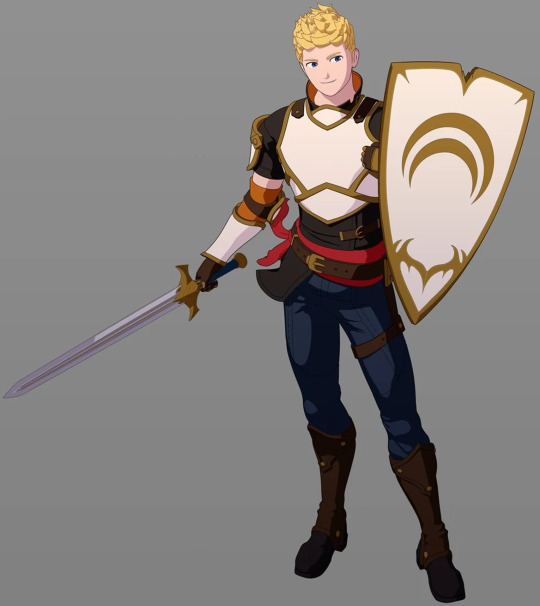
“You're right, Ren. I… I did cheat my way into Beacon. And I'm glad that I had people around me to help me see that I was bigger than that mistake. You've got people around you too. You don't have to force yourself to be strong. The more you hide from what you're feeling, the more alone you're going to feel. Trust me.”
As I mentioned in my previous Versus Series match, this analysis of Jaune Arc's combative abilities will be focused on his appearances until RWBY Volume 8, prior to falling into the Ever After and being displaced in time. The strengths and limitations of Jaune before he became the Rusted Knight are simply more interesting to discuss, and, similarly to Maria Calavera, the significant gap in time between his being sent back and Volume 9 makes equating the two inappropriate. While Rusted Knight Jaune did display just enough in Volume 9 for me to have a good gauge of where he stands, this analysis is already stupidly long (over 6000 words and 11 pages) so pulling a joint profile like I did with Maria will likely bore you out. Although, If you want me to do a breakdown for Rusted Knight Jaune, let me know!
With all that out of the way, let's begin.
PHYSICAL
Jaune Arc is a human male, nineteen years of age when he fell into the Ever After two years after the Fall of Beacon. Born into a family with a history of distinguished Huntsmen and military service, Jaune grew up on stories of heroism and glory, seeking to emulate of his forebearers and dreams of becoming a great legendary hero. Despite this ambition, though the exact reasons are currently unconfirmed, Jaune Arc never attended a combat school, living a wholly civilian life alongside his parents and seven sisters. However, Jaune was determined to achieve his dream to the point of cheating, forging transcripts to gain admission to Beacon Huntsman Academy in Vale. Unsurprisingly, his nonexistent training left him severely out of his depth compared to his classmates, while his misguided belief in his need to excel on his own merits led to him rejecting offers for aid from his teammates. Fortunately, a short conflict with class bully Cardin Winchester led to Jaune eating some much-needed humble pie, and he submitted himself to private tutoring from his partner, the Mistrali prodigy Pyrrha Nikos. Pyrrha’s training greatly picked up the slack and helped Jaune truly develop his skills as a fighter and leader, making genuine contributions to the defense of Vale and Team JNPR’s Vytal Festival battles. Sadly, the Fall of Beacon and Pyrrha’s subsequent death cut his training short, and he found himself thrust headfirst into the war with Salem, his subsequent development coming from direct experience in the field and his being forced to cope with the mounting pressure of his traumatic experiences.
While Jaune Arc’s lack of combat training left him woefully underprepared for academy life and the Huntsman profession, he was ironically well-suited to the physical rigors he was bound to encounter. As the Arc family was known for regular camping trips in Mistral, Jaune was clearly able to develop a high degree of physical fitness and maintained a healthy lifestyle, standing as a surprisingly talented natural athlete. His past as an outdoorsman left him prepared with the harsh conditions of the battlefield, and his formal training ironed out his athleticism to leverage his body for fighting. Easily identified by the blonde hair and blue eyes shared by his family, Jaune stood at a robust 6’1”and sported an athletic, muscular build. In terms of physical performance, his primary attributes were strength and agility, expressed through his joint use of powerful stalwart stances and dynamic full-body maneuvers. Even before his training truly began, Jaune proved himself to be remarkably strong, deflecting aside a Deathstalker’s pincer during his initiation and holding back an Ursa Major’s mauling swipe in the Forever Fall forest. After proper training and combat experience, Jaune grew into a true physical heavyweight, his might, while not matching juggernauts like James Ironwood and Hazel Rainart, being easily comparable to heavy hitters like Yang Xiao Long and Nora Valkyrie. He has sent an Ursa flying with a shield bash, launched grown humans several yards into the air, briefly held back the crushing weight of the Nuckelavee’s hooves, and supported the weight of a Sabyr and Tyrian Callows when they held onto his shield, in addition to various displays of strength-based swordsmanship. In the realm of agility, Jaune may not have been a talented gymnast, but he more than made up for it in grounded speed and parkour even in heavy armor, traversing the battlefield with powerful jumps and running charges while avoiding injury with combat rolls and sidestep evasions. He has kept pace with most of his teammates without too much strain, dodged boulders thrown by a Petra Gigas, blindsided the Nuckelavee by rushing in while it was distracted, and even moved fast enough to intercept Neopolitan’s lunge at Atlas Academy. Though tripped up in sparring with Vine Zeki, he was able to effectively freerun with the aid of his shield through the treacherous landscape of the Solitas tundra while perusing the Hound. Jaune’s reflexes and dexterity were easily his least developed attribute due to his lack of training, though he was by no means slow or crude. Though he favored simple hack and stab bladework, his attacks were still executed with great precision when needed, aiming for one-hit kills. Defensively, he had no difficulty responding to projectiles or other incoming attacks, notably raising his shield in time to block most of the obsidian shards Cinder Fall threw through one of the Evacuation Central Location portals despite being right next to the portal at the time.

While Jaune’s high degree of physical performance was extremely impressive even compared to other Huntsmen, easily his most valuable physical characteristic was his incredible resiliency, stamina, and tolerance for pain and injury. Evan accounting for his large Aura reserves and the properties of his Semblance, the hits that Jaune has worked through are extremely impressive feats. In his initiation, Jaune, despite having no active Aura to protect him, endured the impact of being pinned to a tree after being launched into the woods, and showed no sign of injury until he got scratched by a tree branch a few minutes later. In Forever Fall, he suffered a serious beating from Cardin Winchester that left him with a bruised face, yet he was able to engage the Ursa Major almost immediately afterwards, soaking up more hits and ultimately decapitating the creature. During Team RNJR’s journey to Haven, Jaune worked through a flying rock to the face, physical combat strikes from Tyrian Callows, and numerous mule kicks and blows from the Nuckelavee, yet his Aura never broke or even flickered. In fact, the first time Jaune’s Aura was ever seen breaking in serious combat was when he expanded it to help shield Nora from a punch Caroline Cordovin’s Colossus mech suit (which I’d like to remind you was a giant robot designed to fight kaiju-sized Grimm), overtaxing his Aura and slamming him into a boulder. His stamina displayed itself during the Fall of Beacon, the Battle of Haven, and the Battle of Mantle, all of which were long term conflicts that he fought all through yet remained vital and fresh by the end. In Atlas, Jaune was slammed into a wall by Salem after he burned through his Aura amping Ren, yet was completely uninjured and stayed vital during their escape from the Monstra. It wasn’t until he was forced into close proximity to Cinder Fall’s explosion in the Evacuation Central Location that his Aura broke again, and yet he still had enough fight left in him to regain his feet and attempt to escape. Quite simply, Jaune has spent the bulk of his career as a human punching bag, yet he’s still going strong, wars of attrition being his bread and butter. Jaune was unfortunately saddled with his share of mental hang-ups, his early hubris leading to him making reckless calls before wising up while his traumatic experiences, especially Pyrrha’s death, left him with an inferiority complex that led to him overextending in a misguided idea of sacrificing for his friends. Fortunately, the influence of those same friends helped Jaune learn from his experiences and maintain his composure, trading away the macho badass for an incredibly strong-willed vanguard. Even after being forced to kill Penny Polendina following Cinder Fall’s mortal wound, Jaune Arc never faltered, holding his ground against the Fall Maiden’s savage onslaught despite the grief-stricken tears in his eyes.
Reflecting the irony of being physically prepared for Huntsman life despite having no training, Jaune Arc consistently supplemented his well-honed physique with heavy combat armor, providing him from a degree of protection from the dangers of the world of Remnant. He initially wore only a simple breastplate and shoulder pads, though like the rest of his skill set, his kit evolved and expanded over time. During his time as an Atlesian Huntsman, he wore a full-plated gold-trimmed cuirass, pauldrons, and gauntlets over a black high collared shirt, while his lower body was garbed in blue jeans and rugged calf-high boots. His earlier armor upgrade from an unnamed Mistral blacksmith was specifically noted to provide superior protection from Grimm claws, so the updated plating provided by Pietro Polendina was certainly just as durable, and very likely greater. Though he had no protection below the belt (seriously dude, Adrian needs cousins. get a cup! 😊), the lack of heavy plating still allowed full freedom of movement, maintaining Jaune’s agility. Easily the most sentimental wardrobe component was Pyrrha Nikos’s red sash adorning his belt, a final reminder of his lost love.
RANKING: Tier 2, Peak Human Fitness

Despite a severe lack of training at the start of his career, Jaune Arc still started out as a prime human specimen, and his numerous ordeals have propelled him to the Huntsman physical apex. He is a solidly built athlete with powerful performance levels in all areas that can match or even exceed many of his peers, and supplements this with both an extraordinary level of endurance and some of the best armor we’ve seen in the setting so far. While unassuming at first glance, Jaune’s physique serves as the vehicle for a one-man war of attrition, winning by leveraging his capabilities to stay alive and wait for the perfect opportunity to strike. But much like his friend Ruby Rose, Jaune’s greatest asset as a physical combatant is his resolve, maintaining his composure even in the face of staunch resistance. He won’t give up, he won’t break, no matter what.
MARTIAL

Jaune Arc’s primary weapon was Crocea Mors, a collapsible heater shield paired with an arming sword which was originally carried by his great-great grandfather during the Great War, eighty years before the Fall of Beacon. Despite being an antique compared to what his classmates carried, the weapon remained in excellent condition when Jaune took it with him to Beacon, and it has been further modified and upgraded as he continues his adventures. The sword was an approximately two and a half foot long double-edged blade outfitted with a golden crossguard and a lengthened handgrip wrapped in blue leather. The shield, when fully extended, had a rough area of 2.5 square feet and featured an opening at the top to house the sword, its primary feature being to convert into the blade’s scabbard when not in use. Following modifications from an unnamed Anima blacksmith, the sheath was upgraded to include retractable sharpened edges that could extend upward, transforming it into a stout zweihänder with a heavier blade, enabling far more powerful strikes in combat. The most recent additions to the shield came from Pietro Polendina in Atlas, who outfitted it with hard-light and gravity Dust generators. The former extended barriers to either edge to improve Jaune’s protective zone, while the latter functioned as a combat repulsor. Appropriate given its original owner was a soldier rather than a Huntsman, Jaune’s weapon remains one of the simplest and most utilitarian in the setting, form reflecting function even with its various upgrades. While perfectly capable of slaying Grimm, Crocea Mors was built for war.
As he had never attended a formal combat school nor had grown up with real-world dangers to address, Jaune Arc was woefully unprepared for his early education at Beacon Academy, enrolling on the back of forged transcripts and having amateurish understanding of the field’s basics. Despite this, Jaune was fortunate enough to survive his initiation, and his ability to coordinate Pyrrha Nikos, Lie Ren, and Nora Valkyrie in their takedown of a Deathstalker earned him leadership of Team JNPR. While his early blunders were quite obvious, falling behind in his studies and regularly getting stomped in sparring, Ozpin’s early assessments of the boy’s potential were eventually proven to have merit following his conflict with Cardin Winchester. After a peptalk with Ruby Rose and his successful killing of an Ursa Major in Forever Fall fed him some crow, Jaune accepted Pyrrha’s offer of private tutoring and began to properly develop as a fighter. Under her tutelage, Jaune slowly grew into a capable swordsman and began taking his responsibilities as leader more seriously, eventually qualifying for the Vytal Festival and leading his team to victory against Team BRNZ. While the Fall of Beacon and Pyrrha’s subsequent death cut his formal training short, Jaune continued to train rigorously with her prerecorded lectures during Team RNJR’s journey to Haven Academy and maintained his skill by sparring with his comrades. But more than anything else, Jaune’s greatest growth came through the trial by fire that was the war with Salem, the threats he encountered forcing him to learn quickly and build his skill set through experience. Appropriately for a beginner warrior growing through trial and error in the field, Jaune Arc’s fighting technique was an exceedingly simple and direct sword-and-board method, emphasizing the baseline reliability of the practical benefits of his weapon set. He primarily relied on his shield as the foundation of his technique, using it to intercept or deflect incoming attacks. He alternated between stalwart stonewall stances and active pushback deflections, holding his ground against everything from gunfire to pouncing Grimm while disrupting their own attacks with sweeps and bashes. When he did choose to take the offensive initiative, his bladework consisted of a simple yet powerful array of slashes, cleaves, and thrusts, aiming for one-hit kills. Together, the two weapons enabled a defense-and-counter fighting style, following up his solid blocking sequences with quick sword attacks to quickly disable or kill the target. Though friendly and kind, Jaune never settled for half-measure, always decapitating, dismembering, amputating, impaling, or otherwise seriously injuring his target. When utilizing Crocea Mors in its greatsword form, Jaune’s bladework became less refined yet far more powerful, using hacking chops to deal brutal damage, though at the cost of his defensive stance. Despite lacking variation as a swordsman, Jaune’s simple and loose style was extremely adaptable, allowing him to accommodate to virtually any situation or opponent. This technique was reinforced by his fluid use of his special abilities, most notably his Dust loadout and Semblance to augment his maneuvers. However, Jaune has displayed little in terms of alternative disciplines. Despite possessing a strong physical component in his style, he has never been seen employing hand-to-hand combat in any capacity, and his knowledge of firearms began and ended with blocking bullets. That being said, he has engaged opponents who do use these methods and survived, most notably Tyrian Callows and James Ironwood, so he clearly knows how to combat them even if he lacked proficiency in using them himself. Furthermore, he proved to be a competent mounted fighter, delivering strikes from Pietro Polendina’s hoverbike very effectively in Mantle.

For all the strides he made in his training and advancement in spite of his inexperience, what truly put Jaune Arc in step with his peers was his surprising natural talent as a tactician and strategist. Humbled by his first semester’s failings, Jaune recognized his limitations as one of the least developed fighters of his class, and instead focused on pouring his energies into learning to circumvent them with the aid of his teammates and friends. While his lack of book smarts would make the tactical display out of his element, his ingenuity and ability to recognize the strengths and weaknesses of both his troops and his enemy’s, even under dangerous high-stress situations, more than made up for it. Jaune Arc was not a grand strategizing general; he was a boots-on-the-ground frontline commander, and in his tactics, he heavily emphasized adapting to and subverting the opponent while holding out for the long term. He would open defensively to give him time to assess the threat and give his allies the opportunity to probe for weaknesses. Once an opening was discovered, he would order a swift and decisive response to exploit it, often by disabling the opponents’ defenses and weapons and forcing them to expose the Achilles Heel. Against the Deathstalker, Jaune worked with Pyrrha to defend against its claws while Ren weakened the stinger, and upon seeing this had Pyrrha sever it with her shield before propelling Nora into the air to drive it in. Team RNJR’s battles with the Petra Gigas and Nuckelavee played out similarly, with the beasts ultimately being killed by keeping their limps tied up while leaving its main body vulnerable to Nora’s blows. The Nuckelavee battle demonstrated Jaune’s ability to apply this thinking to wars of attrition as well, as he and Ruby were able to land several critical strikes on the legs while the head was distracted, wearing it down as they cooked up a decisive finishing strategy. As far as more intelligent opponents went, Jaune demonstrated his talents during the Vytal Festival match against Team BRNZ, ordering a retreat following the initial exchange before quickly reengaging, working with Ren and Pyrrha to fend off the bulk of the team and flush out May Zedong’s sniper nest so that Nora could blow her to Kingdom Come. While battlefield situations were Jaune’s specialty, he was still capable of contributing to larger strategic operations, and more importantly, demonstrated an ability to reevaluate and adapt if his plans were derailed. The best example of this was the confrontation with Caroline Cordovin in Argus. The plan was to commandeer an Atlas airship by having Weiss Schnee pretend to return home alone before she and Maria Calavera overpowered the pilots and picked up the others, hiding their return by sending Blake Belladonna to disable the relay tower. However, their hand was tipped when Blake was ambushed by Adam Taurus before she could complete her sabotage, and Cordovin responded by unleashing the gigantic Colossus mech suit. Despite this colossal setback (pun completely intended), Jaune quickly put together a plan of engagement, exploiting the mech’s bulk by having Weiss, Ren, Qrow Branwen and Calavera harass Cordo and chip away at her defenses while nullifying her firepower by evading her attacks. Though the final blow was delivered through Ruby’s initiative rather than Jaune’s his overall game plan and trust in his teammates still enabled them to survive and disable the weapon despite the shock of their original strategy failing.
However, while Jaune was a fantastic field leader and achieved several impressive victories, most of these were done through the strengths and abilities of his allies rather than his own. Jaune’s inexperience and underdeveloped technique left him at a disadvantage whenever he was confronted by a skilled opponent in single combat, his success predicated on his versatility and tactical supremacy rather than his ability to fight. His first true victory against the Ursa Major demonstrated his tenacity and the raw talent he did have, but he nearly lost his entire Aura during the scuffle and survived only due to Pyrrha’s interference. Despite pulling his own weight in the Vytal Festival and against Tyrian Callows, his personal performance mostly amounted to soaking up punishment while everyone else tried to make headway. While Jaune had improved significantly by the time of the Battle of Haven, the psychological strain of his experiences combined with Cinder Fall’s posturing triggered an outburst from the still-grieving Jaune, who recklessly charged the Fall Maiden with his greatsword. The only reason Jaune lasted as long as he did was because Cinder drew out the fight to play with her food, the closest thing he made to headway being when he scored a superficial graze on her face mask after she was stunned by Ruby’s Silver Eyes. Fortunately, Jaune managed to get into a much healthier headspace following his time in Atlas and learned from his experiences. In addition to improving his calm under fire, he managed to apply a solid measure of his tactical sensibilities to personable combat. This was where his heavy defensive focus truly started to express itself, shifting his focus to protecting himself, his allies, and his charges and only attacking when the blow could efficiently end the immediate threat. While his core technique was underdone, his tandem use of his alternative abilities allowed him to adjust to different situations even if he couldn’t win himself.
In Mantle, Jaune slew numerous Grimm in the streets by intercepting their attacks before immediately striking back, notably impaling a Sabyr after it jumped onto his shield and later throwing a hard-light Dust grenade into a pack of Sabyrs for them to faceplant into. While unsuccessful at evading Vine Zeki while sparring in Atlas, he achieved greater success when he fended off Flynt Coal’s Killer Quartet, enduring the assault before closing in and overpowering him. Against Neopolitan in the Atlas Academy dorms, Jaune managed to intercept her running charge and blew her backward with his gravity Dust repulsor, though he and the rest of his team were ultimately outmaneuvered by the assassin and forced to flee with the arrival of the Atlas security forces. When confronting James Ironwood two days later, Jaune immediately followed up Emerald Sustrai’s disarmament and kick with a slashing sequence, and though the general was able to stop him and counter, Jaune immediately turned it around with his repulsor, giving Oscar Pine and opportunity to run in and attack himself. In these various encounters, Jaune demonstrated great skill and fending off direct aggressors and using their energies against them, even when fighting opponents far above his own level like Ironwood. Rather than just enduring an attack, he brought it to a halt by disrupting their forward advance and landing devastating counters. Conversely, Jaune was less successful against more subversive opponents who could outmaneuver and undercut him, which is what he faced against Neo and ran into against Tyrian Callows in Oniyuri. Furthermore, his success was predicated on his ability to strike at the moment of greatest vulnerability, and if unable to get the drop on his target, he could get into trouble very quickly. Putting these strengths and limits on display was his second confrontation with Cinder Fall during the exodus to Vacuo. Despite seeing his old nemesis again and witnessing Yang Xiao Long’s apparent death, Jaune remained composed and focused on ensuring the civilians could escape, only engaging himself when the last were gone. He opened by flying in and blowing Cinder back with his shield and standing with Weiss and Penny Polendina, prepared to coordinate against their more powerful adversary. Unfortunately, Cinder divided her assailants and mortally wounded Penny, forcing Jaune to tend to her while Weiss was on her own. After Penny had Jaune reluctantly kill her to keep the Winter Maiden powers out of Cinder’s hands, an enraged Fall lashed out, but Jaune, despite his extreme emotional stress, stood his ground and repelled her. However, Cinder recovered too quickly for Jaune to properly retaliate, and he was quickly overwhelmed when the Fall Maiden destroyed his weapon.
RANKING: Tier 5, Standard Application
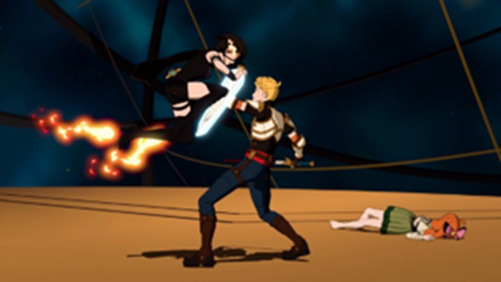
Jaune Arc’s inexperience and limited performance in single combat make it clear that he is not a master, but he still possesses a well-rounded and comprehensive skill set that covers his bases and improves his overall viability. His greatest asset is his intelligent tactical analysis on the battlefield, enabling him to adapt to situations and exploit weaknesses, even if someone else lands the killing blow instead of him. In single combat, he can contend with superior martial artists by leveraging his techniques to nullify their offensives and hit them where they don’t expect, though his battles with Cinder and Neo prove that this has its limits. Appropriately, Jaune Arc wears Pyrrha Nikos’s influence on his sleeve, both being talented albeit thinly spread fighters who compensate for their lack of development by using all of their skills together. The difference is that where Pyrrha built a special weapon to enable all of her attack options in her technique, Jaune supported his basic technique with strong support gadgets and good armor to provide a margin for error. Jaune’s feats make him seem better than he actually is, but unlike Volume 1’s macho dofus, Jaune is now aware of this, and has built his tactics accordingly.
SPECIAL

Jaune Arc was a late bloomer when it came to his Semblance, unaware of his abilities even after a year of formal training and thus making him an anomaly among his peers. It was not until the Battle of Haven that Jaune finally properly manifested his powers. Named Aura Amp, Jaune’s Semblance allowed him to amplify and enhance the Auras of both himself and others, bolstering the affect of the manifested soul power. All Auras bless their users with moderate protection from direct injury, mitigating minor wounds, and the ability to utilize their own Semblances. When amplified by Jaune, these abilities became far more pronounced, strengthening Aura shields far beyond their limits, enhancing the magnitude of a Semblance, and turning the mild regeneration into active healing, this last part easily being the most pronounced of Jaune’s powers. The first time his Semblance unconsciously activated in the Forever Fall forest, Jaune was able to recover from the beating he took from Cardin Winchester fast enough to immediately engage the Ursa Major. This went even further when he properly unlocked his Semblance at Haven. After Cinder Fall impaled Weiss Schnee in order to spitefully torment him, Jaune’s emotional distress over another friend being severely injured on his watch, coupled with his need to save Weiss’s life finally caused his powers to properly manifest. Despite the fact that she had clearly gone into shock and was suffering from serious blood loss, Weiss was able to regain consciousness after mere minutes of treatment, and after a few more had regained enough of her energies to Summon a Queen Lancer and fight through the remainder of the battle. Making this even more impressive was that Jaune was able to accomplish this instinctively and with little to no effect on his stamina. Jaune refined his abilities for active use in the following weeks, to the point where he could casually heal the Huntsman Dudley’s broken arm on the Argus Limited, and later treated the battered Oscar Pine after rescuing him from the Monstra. Beyond healing, Jaune’s ability to amplify Auras allowed him to empower the barriers of others to help them endure incoming attacks. In Argus, he bolstered himself and Nora Valkyrie to brace against the Colossus’s punch, and thought disabled by the hit, Jaune’s power still saved their lives. On a smaller though no less impressive scale, Jaune’s amplification proved instrumental in allowing Penny Polendina to resist the effects of Arthur Watts’ computer virus, allowing her human soul to overpower her circuitry. Most impressive by far was Jaune’s ability to enhance others’ Semblances by adding his strength to their own. Lie Ren was his most common partner in this, empowering Tranquility to the point where Ren could mask the entire Argus Limited train and whole mobs of civilians in Mantle, as well as conceal at least ten trained Huntsmen from detection by whole armies of Grimm. When Penny nearly succumbed to Watts’ virus, Jaune’s enhancement of Weiss’s Glyphs allowed them to restrain her long enough to offer aid. However, Jaune’s Semblance was not without its limits. Prolonged use could drain his own Aura quickly, and even his own substantial Aura reserves were not limitless. Furthermore, his healing powers could not mend all injuries, as Nora’s electric scars and the severity of Penny’s mortal wound from Cinder were beyond his ability to heal.
In addition to his Semblance, Jaune added to his arsenal with Dust gadgets during his time in Atlas, specifically the hard-light panels and gravity repulsor built into Crocea Mors’ shield. Pioneered by Atlas and therefore costly to obtain outside of it, hard-light Dust is most commonly used in the creation of advanced defensive technology, generating tangible panels of energy strong enough to withstand severe kinetic impacts. The projectors installed in the edges of Jaune’s shield could create barriers approximately a foot and a quarter wide and running down the full length, effectively doubling his range of protection, improving his ability to function as a defensive wall for himself and his allies. While the strength limits of these projections has never been tested, I do feel they are at least comparable in strength to the shields created by figures such as Weiss Schnee and Arthur Watts, who were able to hold back the White Fan Lieutenant’s brutish chainsaw blows and block high-caliber gunfire from Due Process respectively. More contemporary but no less potent, gravity Dust affected forces of push and pull in ways meant to facilitate adhesion, propulsion, and levitation, traits that made it an extremely common fuel in vehicles. When applied combatively, gravity Dust used these same properties to function as limited telekinetic attacks, usually through the guided manipulation of thrown weapons, enhancing the tactile striking power of manual weapons, or, in the case of Jaune, powerful offensive shockwaves. Outfitted in the center of the shield, Jaune’s repulsor enabled him to project bursts of power that pushed out in all directions, strong enough to repel charging enemies and deflect attacks though not enough to actively damage his environment. Though unable to injure Neo, Ironwood and Cinder directly, the repulsor was still strong enough to stagger them, potentially setting up for a follow up strike. This weapon in particular became Jaune’s most readily utilized combative tool, his favorite tactic being to activate it just as the opponent came within striking distance, essentially delivering shield bashes with a touch of a button. Despite only recently taking these gadgets up, Jaune quickly became highly profieient in their use, smoothly integrating these abilities into his overall fighting method and together with one another. In addition to combining the functions to turn his shield into a makeshift hang glider, Jaune could project the gravity waves to push back obstacles while activating the hard-light panels to cover his flanks, using this very method to clear away a pack of Centinels while infiltrating the SDC mine. This combination tactic further demonstrated Jaune’s approach of utilizing all his abilities together as part of a greater fighting method, getting around his lack of power and skill through versatility and logistics. At the same time however, Jaune’s Dust abilities had their own individual limits. The hard-light panels were a very specialized tool, and Ironwood’s ability to penetrate Watt’s barriers proves that even special Atlas Dust can’t take a beating forever. While the gravity repulsor gave Jaune an offensive option, the kinetic output wasn’t sufficient to injure or kill, forcing Jaune to rely on other means to decisively defeat his adversary.
Regarding Jaune’s use of his special abilities in live combat, he clearly emphasized versatility over lethality, sacrificing offensive might for tactical supremacy. While his Semblance’s properties have been most impressively demonstrated on external subjects, Jaune can and has used the power on himself to potentially decisive effect. While training in Atlas, Oscar Pine observed that Jaune’s Aura was recovering at a significantly faster rate than usual, which leads me to believe that, similarly to Hazel Rainart’s Numbing Agent, Aura Amp functions as a minor healing factor to help Jaune replenish his energies. Unlike Rainart, however, Jaune’s active use of his Semblance can allow him to do this on command and more quickly, which, combined with Aura Amp’s healing properties, makes him one of the only characters with the ability to mitigate his own injuries in the field. Both of his Dust gadgets follow similar patterns of improving Jaune’s survivability, the hard-light shields artificially bolstering his martial defense while the gravity repulsor adds a layer of counteroffensive. The latter has proven effective and giving Jaune a punch against opponents above his own level, successfully repelling Neopolitan, James Ironwood, and even Cinder Fall TWICE. However, much like his martial skills, Jaune’s effectiveness as an ethereal combatant is predicated on his breadth of tools rather than their magnitude of his native proficiency. His Semblance is almost entirely a tactical support power, and its various powers still have their limitations that make its efficacy in single combat suspect. While a number of factors were at play when Jaune was forced to euthanize Penny, the narrative framing makes it clear that the severity of her injuries would have been beyond his ability to repair even if he had time and shelter. As far as his Dust abilities are concerned, Jaune may make creative integrations of his powers into his fighting style, but neither his shields nor repulsor have the means to decisively end the battle on his terms. The effectiveness of the gravity repulsor is based around its ability to stagger the opponent and set up for a counterattack, meaning its effectiveness is significantly reduced if the opponent recovers quickly enough to exploit Jaune’s lack of skill as a martial artist. Against Neopolitan, the attack was able to disrupt her forward charge and launch her down the hall, prompting her to retreat. Against Ironwood, Jaune had the support of his allies, with Oscar rushing in to attack immediately after the Dust activated, while Weiss and Penny were clearly preparing to do the same against Cinder. Jaune wasn’t so lucky when he was forced to fight Cinder on his own, their final bout taking place when Weiss was already disabled and Penny was dead. With only his native abilities as support, Jaune’s final push against Cinder merely provoked her, and her quick recovery allowed the Fall Maiden to rally and shatter his weapon, Jaune’s survival owing entirely to the timely arrival of Winter Schnee.
RANKING: Tier 5, Limited Combat
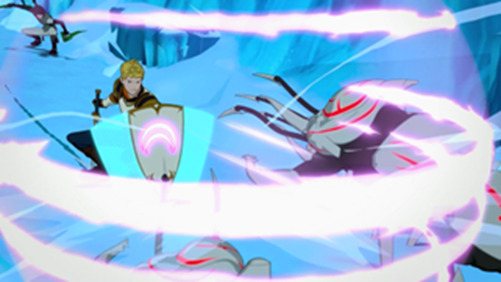
Much like his fighting abilities, Jaune Arc’s special powers are comprehensive and versatile, but they lack the development to reliably set the battle on his terms. His Semblance offers various supportive abilities that improve his survivability in the field, while the traits of his Dust loadout add layers to his fighting style, all coming together to cover all of his bases for just about any combat situation. At the same time, he lacks the developed skill with these powers to properly control the engagement, getting by through the breath of his skill set and his intelligent use of all of his skills. Rather than mastery of his abilities, Jaune Arc relies on clever gadgets to artificially elevate his fighting style into something greater than the sum of its parts, and his baseline reliability hinges on circumstantial factors. However, Jaune ‘s limitations do not make him any less of a threat, and his cunning use of the various tricks in his bag means that he can still comfortably engage any situation even if he can’t always win.
OVERALL RANKING: TIER 5, STANDARD HUNTSMAN

Compared to the true masters of his era, Jaune Arc is not a particularly exceptional combatant, but he is still significantly above the rank-and-file. On the back of his martial skills and special abilities, Jaune stands as the archetypical example of a Tier 5 combatant in the RWBY setting. His foundation stands on his rock-solid physical attributes, his exceptional athletic performance levels giving him parity with better trained opponents and his inhuman resiliency giving him the ability to work through the hits he needs to take, further supplemented by top tier combat armor. With his versatile weapon set, solid general purpose fighting technique, potent empowering Semblance, and flexible set of Dust tools, Jaune possesses an extremely comprehensive skill set that leaves him prepared for just about any combat situation, but his lack of developed skill means that none of these attributes are elevated to a degree that can decisively tip the scales of the battle in his favor, leaving him spread thin and vulnerable against more skilled adversaries. However, being a jack of all trades/master of none does not make one an inept combatant, as Jaune’s attributes still give him a degree of adaptability and grit that many more specialized fighters tend to lack. Jaune’s saving grace is his tactical mindset, allowing him to circumvent his limitations by using all of his assets, be they his own or those of his allies, together as a layered combative tool to stay alive and win in the long term. Furthermore, despite his lack of formal training, Jaune has spent almost his entire career either on the battlefield or contending against opponents far above his own level, and he has still survived.
Jaune Arc’s ranking shows that he is not yet a true master combatant and still has a long way to go before truly matching his peers, but his track record also makes it very clear that he is growing very quickly and will undoubtably match or exceed them. He is a rising star, only held back by a series of roadblocks that continue to temper him. Jaune entered Beacon feeling that to be a Huntsman and a hero was to be a mighty warrior standing on his own laurels, though the harsh realities have not only shattered this narrow worldview but also brought out Jaune’s true route to greatness. Similarly, Pyrrha’s death led him to believe that self-sacrifice was all he was good for if it meant giving his friends a chance to survive, but those very friends made it clear that throwing his life away would only hurt them more. Instead of laying waste to armies of enemies as a one man badass, he has grown into a stalwart defender dedicated to surviving to protect those that cannot do so themselves. Rather than the lethal blade of his sword, it is the impenetrable shield in his off hand that has come to define the kind of hero that Jaune Arc is. He will stand firm against evil for the sake of others, holding out as long as he must while searching for ways to end the threat with as little lives lost as possible. The strength of this shield need only be gauged by what it and its wielder has endured. The Breach, the Fall of Beacon, the Battle of Haven, the Atlas Crisis; Jaune Arc survived all this and more, and he has emerged all the stronger and wiser for it. Pyrrha Nikos saw more in Jaune than the rest of them did, and I think it’s safe to say that she could not have been prouder of who he has become; as a Huntsman, as a leader, as a warrior, and more than anything else, as a man.
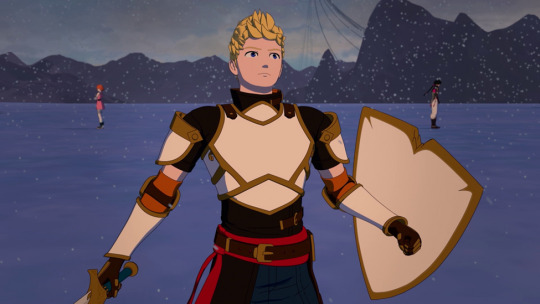
*originally posted on RoosterTeeth Community page on 06-8-22*
* images taken from RWBY Wiki*
RWBY Combat Analysis
#rwby#rwby combat analysis#jaune arc#rwby jaune#beacon academy#team jnpr#peak human fitness#standard application#limited combat
97 notes
·
View notes
Photo

I’ve done a million studies of his face shape at this point and I STILL feel like I’m not getting him correctly. You should see my WIPs folder it’s full of things like this (but less clean). It’s the price of liking a character too much I suppose,
[ID: Two black and white sketches of Kim Kitsuragi and one trace over deconstruction of his official portrait. In the first sketch he’s looking slightly up and to the right. In the second sketch he’s holding one glove in his teeth while massaging his ungloved hand. /End ID]
#Disco Elysium#Kim Kitsuragi#If you're reading these tags and know Art Things then I'm on my knees asking for critique#Y'know that stage when your analysis and perception are more trained than your practical application? But not enough to spot things?#Getting there I really am. Exciting though because that means it's GROWTH time#ANYWAY I'm off now have fun with this Kim sketch
279 notes
·
View notes
Text
every time brennan says psychology is a "soft science" i’m like. bestie. beloved. i’m so sorry but i have to tell you something about anthropology
#bones tv#temperance brennan#to be clear i think the hard/soft science divide is unhelpful and just vaguely dismissive of social sciences n stuff#but it’s ironic that she cares about this divide#it’s SO funny cause like 90% of the insults she directs at psychology are also applicable to anthropology#forensic anthrology is more towards the ‘hard science’ end of the spectrum but only bc it involves other sciences - human biology for eg#and most of the ‘hard science’ on the show is actually hodgins’ doing w/his biology & chemistry & physics#he has doctorates in entomology + botany + geology after all#and it’s cam who does most of the medical stuff. and unseen ppl who do particulate analysis#but i could never tell her that her argument doesn’t make sense bc i love her too much <3333
38 notes
·
View notes
Text
I think it would do ML campists good to develop like some basic skepticism instincts instead of saying credulous things like this:
The key takeaways are; firstly, that the Communist Party of China is working to resolve the urban-rural divide, very directly; and secondly, that they are doing so in the manner that they do everything: realistically and pragmatically.
20 notes
·
View notes
Text
hitting this article with a rolled up newspaper. bad. stop it

sigh. exhaustive argument that none of these shows grouped together have the same art style below, complete with images and whatever
oh also im not the type to comment on articles so idk the etiquette but don't like. go over there and say "ur list sucks >:P" that's just gonna bring more traffic to it. i linked it so people could ratio me if need be not so that you guys could dunk on this random listicle writer. it's pointless and kind of cruel. just so we're clear on that
edit: the quote above uses "time period" instead of "era". i quote it as saying "era" a lot. i'm not fixing that
note: here i'm assuming "art style" refers to, generally: character designs (facial and body proportions, how things like hair is dealt with, etc), lighting, color (palette, saturation, value), line weight, etc [and mostly excluding things like shot composition, direction, etc because while those probably count my personal experience with these shows is mostly limited, and because most people focus on the previous things i've listed in their discussions of art styles. the analysis within the article is incredibly shallow, and if they think samurai champloo's art style is "rehashed and reused", i don't think they're like. super deep in the art analysis sauce. anyway]
code geass vs death note. what are you saying. what are you talking about






code geass' approach to color is more vibrant, and dn's is more washed out. dn takes a more realistic approach to faces and bodies, both in proportion and in shape (namely how curved their features are (as opposed to cg's far more exaggerated sharp faces, large eyes, and lanky bodies. note how lelouch's lips barely jut out in profile, for instance)). i shouldn't have to explain this they're not even close
that's the most extreme example, but samurai champloo and cowboy bebop aren't That similar either



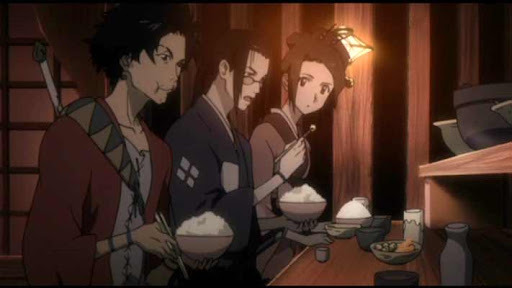




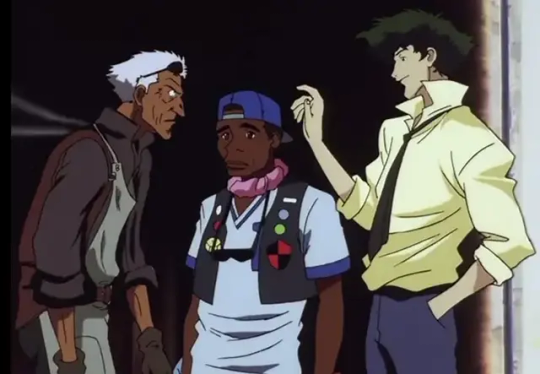

it's hard for me to speak on bebop for the most part because i've never seen it (vs my ~8 eps of samurai champloo knowledge), but from what i have seen, bebop often has a sort of delicate intricacy to a lot of its linework (especially its backgrounds) that champloo tends to sacrifice in favor of bolder lines and higher contrast. it was hard to find great examples, but the silhouettes champloo's characters cut are often sort of.. choppy and wild, and usually lanky and stretched-out, while bebop's are more realistic (focus on the shoulders in the last image set, for instance). there's overlap, sure, but there are clear and intentional differences in the designs, to say nothing of champloo's higher saturation and the natural differences between hand-drawn and digitally-drawn animation
(and if "art style" is referring to the direction rather than just character design, lighting, color, etc, it's because these two have the same director, which hardly creates an "era". that's like comparing two miyazaki films from the 90s and saying "this is what 90s anime movies looked like", it's nonsense. also, i feel like lumping these two together because they look a little similar is unfair because they're pretty unique from their contemporaries in their own right. they may resemble each other a bit, but how much do they resemble other late 90s early 00s sci-fi/historical anime? does samurai champloo look like outlaw star to you? or trigun? or evangelion? does cowboy bebop look like ninja scroll? or samurai 7? or sword of the stranger? etc etc etc?? if we're claiming that cowboy bebop and samurai champloo share an "era", then what of their contemporaries, and what about differences across bebop and champloo's very different genres? more on this point later)
even fruits basket and ouran, the ones i initially felt were most similar, have clear distinctions

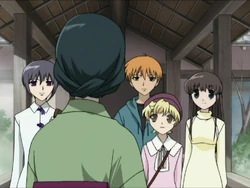
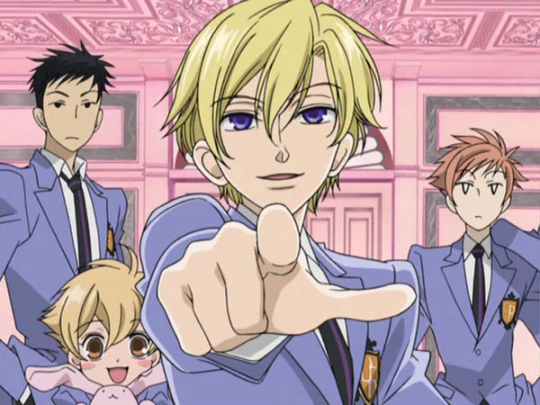

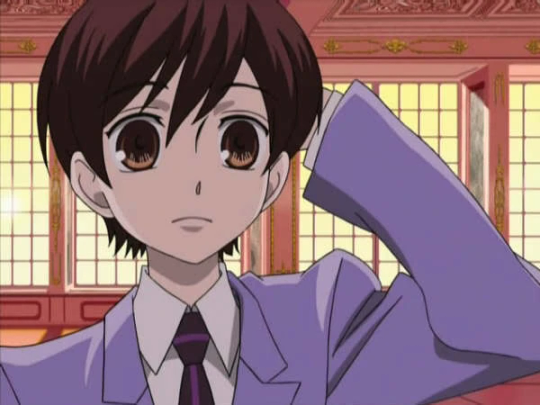


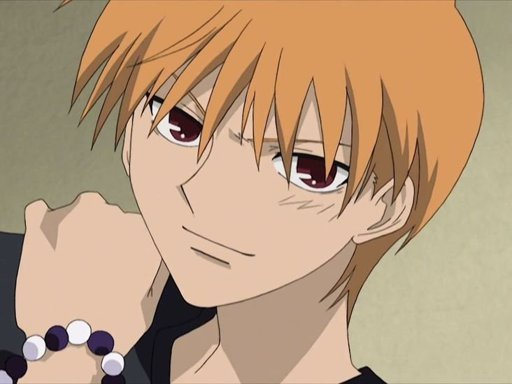

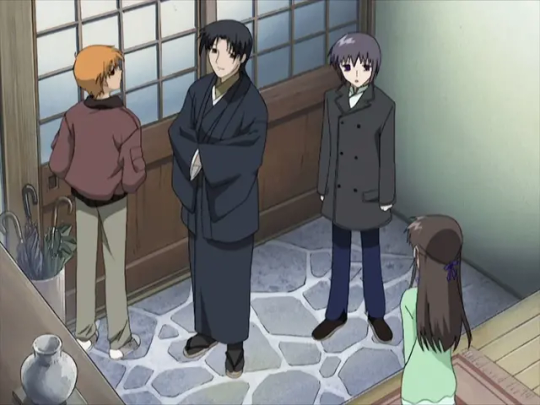
ouran's got a distinct abundance of pastels in its color palette, tending towards pinks, blues, yellows, oranges, etc. its use of black and brown is very limited. fb's palette is a bit more relaxed, and while its colors are often pale, i wouldn't call them pastel (they also skew more towards natural, earthy tones). fb's characters have noticably.. flatter skulls? in some shots, and their heads are so squat that they can seem consumed by their eyes. anyway this is a trait ouran does not quite share, for a number of small reasons, like how their cheeks bow out, greater emphasis on noses and mouths, and its use of highly variable line weight (vs fb's very stable line weight). hair is more voluminous and multilayered in ouran, and features like lips and noses (esp noses) are fuller, more three dimensional (in general, ouran's approach to shading hair and faces makes the characters feel rounder). the sharp edges and bell-sleeves of ouran's uniform blazers are actually far more reminiscent of the designs in code geass than fruits basket, imo. (actually.. i'm not sure how to express this but a lot of the poses in ouran resemble code geass poses, in their locked-joint arms-stretched kinda way). ouran forgoes hair-shine, while fruit's basket adds them in either jagged points (see most of the images i included) or a sort of triangle wrapping around the head (not pictured here, just trust me)
(note: i'm assuming they are referring to the 2001 anime adaptation of fruits basket rather than the 2019 one, because not only does the 2019 adaptation resemble ohshc even less, but because they are closer in time period, and the grouping is supposedly based on era).
my point is none of these shows look rehashed from one another. there's sometimes overlap, but each has a unique aesthetic based in many small choices made in their design.
now let's look at their use of "eras" a little more. this is the timeline of air dates for the first episodes of the six shows mentioned (for their original japanese runs, obviously):
cowboy bebop, april 1998
fruits basket, july 2001
samurai champloo, may 2004
ouran high school host club, april 2006
code geass, october 2006
death note, october 2006
code geass and death note being paired by era is, at least, accurate. same month, same year. it's about as close as one can get. however, the other two groups are far more removed from each other. fruits basket and ouran have five years between them, and bebop and champloo have six. this wouldn't be such an issue if there weren't other anime within this list that came between them. if bebop and champloo are in the same era, why is fruits basket grouped differently? ouran came out in 2006 just like code geass and death note, so why is it grouped with something that came out five years prior instead of them?
i think it's fair to say that eras are not purely chronological, that there's overlap between them. one doesn't begin as soon as (and not a moment before) its singular predecessor ends. but era feels like an incomplete distinction here. this list alone shows quite a lot of variety for what someone can mean when they say something "looks like 2000s anime". most anime fans have a picture in their head of that, and, to be so honest, i don't think samurai champloo is it. using only time as a distinction rather than movement, genre, etc is simply not enough. the fact that 5/6 of these shows occur within 2001-2006, and yet they're set apart into three different eras, and each pair (in ways i'm sure the author of this piece would admit) does not resemble the other, is proof enough that 2001-2006 did not have one repetitive art style, at least not in a way these anime exemplify. that's to say nothing of whether or not the anime within the era-pairs look the same, which we've established i don't. but since they don't actually tell us what their eras are, we can only speculate. personally, i speculate that they didn't think about it too hard at all, or even look up the release dates, going off vibes instead, if that.
when this person is talking about "eras", i think "eras within certain styles or genres" is more accurate, but even with these in mind, matching shows up like this makes a lot less sense than i think they realize. death note and code geass are sometimes lumped together because they're both mind-gamey thrillers with megalomaniacal protagonists with a single unique power that they use to try and fix/control the world, not because of their art styles. trying to say they look the same just because they share plot elements and came out around the same time is just... really weird. fruits basket and ouran both fall into early 2000s shojo, which is part of why the comparison fits more. target demographics and what magazines cater to those demographics (and thus the aesthetics of those magazines, which you have to fit into enough to get your manga published, and which also just influence what you want, what readers want, etc through exposure) (<- oversimplifying) are an actual valid point of comparison, at least more so than "idk 2006 lol". even if the result is more like "romcom for girls, 2006"
it doesn't help that many of the choices they made for unique art styles don't feel particularly "unique" to me.



choices like mononoke and land of the lustrous i get. and i'm not saying any of the examples i've just pulled or in the article are bad art styles, or that they don't bring anything unique to the table. i'm sure many of them are beautiful, and help elevate the tones of the stories, and all that jazz, whatever. but if the name of the game is "unique", then i don't think these cut it from what i can see. it doesn't help that most of the analysis comes down to "it looks really really cool" or "you don't normally see this art style with this genre/tone" (which is not the same thing as being broadly unique, imo)
it could be that we have different impressions of what "art style" means. it could lie somewhere in the bits of art style that i cut out, like shot composition and direction, etc. and some of it is probably a difference in what constitutes uniqueness, both between our differing experiences with media and personal taste/philosophy. but i don't think i'm wrong here when i say that the assertion that samurai champloo is era-typical in a way that beyond the boundary (2013) isn't is just fucking wrong.
look i know that bit that i screenshotted that started all this was a filler paragraph. i know it was the mandatory setup for the listicle you scroll to immediately, the parts you're supposed to ignore. i usually ignore articles like this completely because they're kinda bullshit. but i think this hunt for what looks the most unique is a flawed and confused one, at least to some extent. especially when all of the justifications are like "it supports the vibe well", which is something that all art styles are supposed to do, no matter how "unique" they are or are not, and i think that when people discuss things like art styles and anime and what looks generic and what looks unique, lumping things together too much often removes the nuances that really do influence people. i'm an artist. it's gonna sound dumb, but the way things look matters to me, even if it's stuff like how shirtsleeves or noses are drawn. to ignore all these little differences that make each piece unique is to blend so many singular, unique things into this easy-to-categorize mush that just... does a disservice to the choices every artist makes, i think. even if it is a pretty mild disservice. again, i cannot stress enough that this article is not important, and that this post responding to it is also not important.
look, what i'm trying to say is stop and smell the roses. notice the differences in the art you consume and think about it. looking for something that's so different it jerks your brain around is cool and good and fine and normal, but to disregard things as "basically the same as xyz" is reductive and icky and i don't like it. if you want something unique idk go watch kaiba (2006) have fun it's really good. i'm going to bed
nvm miscellaneous gripes section + i go to bed at like 5am lol i LIED:
the only thing said about beyond the boundary's art style is "it's hard not to fall in love with the art style", and the rest of the comments are other elements. that's too vague! i'm docking points!!
a lot of this seems based in the color palette now that i'm rereading it. not that my analysis doesn't also involve that, and not that that's invalid, but it makes me think there uh. might not have been Too too much thought beyond that. (example: "Though the dark and cool colors provide a sense of dullness, these colors cater to the tone of the story, which is dark and representative of its heavy content." like. that's not. unique. that's not unique to solo leveling y'know to have a dark story be awash in dark and cool colors that's pretty normal actually. maybe how they do it is unique, but we'll never know bc i haven't seen solo leveling and the author didn't care to elaborate :/ oh well)
this one's petty but i actually think ohshc's art style is pretty unique. maybe it's just because i've seen it several times and certain details like how the bottom-lip-to-chin shadow is done have caught my attention but like. pouting crossing my arms huffing >:( i think it's unique wth...
demon slayer's an alright choice i agree. idk i barely watched it a few years ago and it still wrenched my art style in a new direction. i dunno anything that looks quite like it. i'm not mad about all these choices per se it's just hard to whittle something like uniqueness down to a top ten list, i guess. and to say samurai champloo's generic while violet evergarden is the 5th most unique anime you've ever seen is like. weird. you're setting yourself up for people to go ehhhh... idk...... if you're not picking stuff that's like. Clearly Out There (i.e. mononoke)
"It’s no surprise that Demon Slayer is an anime with some of the best art styles." i might be fighting something that was written by ai now that i think about it...
oh god this was totally written by ai. or it went very unedited. man i spent like 2 hours on this (<- LOSER LOSER). they can't decide what the plural of anime is
they insist that chainsaw man's art style is weird enough to maybe put people off, and the only reason i can think that is is bc it's cg. but don't do the same for land of the lustrous, which is also and much more obviously cg. idk
they phoned it in but didn't even include that ping pong anime smhing my head. y'know the one everyone includes. which means whoever wrote this actually did stick to personal choices over crowd-pleasers, or chatgpt goofed or whatever. idc. guys they didn't even put flcl (<- but they put gurren lagann? as a gurren lagann fan im confused) oh my godd
ik i said this before but im saying it again: a lot of their pros and cons come down to whether or not an art style is typical for that kind of story, so like whether something gritty in tone has a more realistic art style or whether it has something visually cutesy instead. art style is more than just those things, but even that analysis is like. pretty much as bare-bones as what i just said. yucky
oh also part of my issue with this (didn't phrase it right sorry) is like. "unique" is a broad term. a really broad term. it can mean anything. there is no top 10 anime with unique art styles article that would escape that problem, and my analysis here does not escape that problem. i find the term a little unproductive (same with the concept of "originality"), so just know that i guess
#this doesn't even go into things like shows with variable art styles. yu yu hakusho cycles through storyboarders in a very obvious way#and jojo's bizarre adventure's art style adjusts for every part (creating a sort of average for the gradual shifts in araki's style over th#course of that part). and that's off the top of my head i'm not even like a big boy weeb y'know#listen take all of this with a grain of salt i haven't watched any of these all the way through (minus ouran) and some of them i haven't#watched at all. but a lot of this is evident from just Looking at stills and footage bc it's a visual thing. that's gotta count for smth#at the very least i'm confident that my analysis is um. better than the person who wrote this's analysis. so yeah#i'll have to think more about the difference between something being overall unique and unique in application to smth else because im....#not 100% settled on the idea that one is the True Meaning Of Unique. again part of my problem with this is the oversimplification of unique#the concept y'know so like. whatever#noticing more differences. ouran includes the nose bridge/beginnings of a brow more than the middle line of a nose or a sole dot like fb
8 notes
·
View notes
Text
Okay
Sonic Prime theory time
(Because I'm going through it right now)
Specifically I want to talk about my own answer to the question "How will the show end?"
ㅤ
Thoughts/Analysis under the cut
Season 2 Spoilers
ㅤ
So, as I see it, there are about three possible endings.
Ending 1: Goodbyes are said. The universe is reverted back to its state before the shattering and Sonic gets his original friends back. (May also come with sonic being the only one who remembers what happened, but I can't rule out the concept of his friends remembering anything as well)
Ending 2: Sonic comes to terms with the fact that he can't bring back the original Green Hill and his old friends as they were. The shatterverse continues as is. (This most likely constitutes in a bit of a bittersweet ending where everything continues as is, but Sonic swears not to forget what things were like before)
And Ending 3: Sonic gets to have his cake and eat it too (He manages to fix ghost hill and bring his original friends back while the new shatterspaces and his new friends/all the new characters also get to stay around)
ㅤ
Originally, while being partial to option 3, I assumed option 1 would be most likely. After all, option 3 originally originated as my happy "everyone lives" idea. I liked (and still do) imagining the possibilities that would arise from the universe from Sonic Prime entering a Kingdom Hearts-like state (where either the characters can travel freely between worlds while still needing to be conscious of each shatterspace's order, or travel between them is nonexistent/extremely limited). While I liked the bittersweet nature/possibilities of option 2, I found that outcome to be more unlikely given the show's audience.
I'm not saying that shows that keep an audience of children in mind can never end bittersweetly or that it's never happened before. It's just more like I find it hard to see those involved in the show effectively rendering beloved characters as dead/gone forever and make Sonic move on while with "different versions" of said characters.
However, now I'm a bit more inclined to believe in version 3 (the "everybody lives" ending), and here's...my long winded way of saying why
ㅤ
So, about where I changed my mind is when I realized that Sonic Prime...isn't a typical alternate dimensions/multiverse storyline, especially with what seems to be it's basic framework.
So, when Sonic shatters the paradox prism, all of his friends and Green Hill are shattered as well. So it stands to reason that 5 different facets of his friends became splintered between 5 different versions of green hill, right?
Wrong.
I've seen a few different claims on what's going on here (usually to explain the other versions of Sonic's friends and their personalities). One of the most prominent is that each of the Amys, Tails, Knuckles, what have you, are meant to represent different pieces of those characters (i.e. that Rusty Rose and Thorn Rose represent different parts of Amy Rose's personality), and thus each versions of a singular character make up the whole of the original one. This of course functions on the idea that there *are* five different worlds of which there five different alternatives of any given person (or at least of those caught in the original blast) and that they all (personality wise and/or objective wise) are different necessary pieces to make up the whole of said characters (should Sonic want his original friends back).
But the inconsistencies in this framework (for which most of this theory's merit hinges upon) start beginning in the very first episode of season 1 "Shattered".
After "The Shattering" Doctor Ivo "Eggman" Robotnik returns as The Chaos Council (five different versions of Robotnik from seemingly different points in a singular lifespan, who refer to each other by nicknames). Of course it would make sense if these 5 (the chaos council) all came together after conquering their respective shatterspaces, using New Yolk as a central headquarters; however, we soon learn that this is not the case. The council only begins to learn about the shatterspaces and more about the shard energy they posses later in season 1, and season 2 elaborates upon the state of (formerly) Green Hill during it's conquering (building upon what the audience can gather from Renegade and Rebel's testemony of the event). Specifically we note that the five conquered (formerly) Green Hill and built New Yolk together. Evidence of course suggests that the five came to be in the same shatterspace, even possibly at the same time. No matter how perfect it is that there are five of them (one for each shatterspace as they set out to conquer the shatterverse), they all originated in a single universe rather than being split up across five separate ones.
And speaking of there being five eggmen, why don't we move onto inconsistency two?
Outside of Eggman, there exists only three alternate versions of Sonic's friends (this includes Amy, Tails, Rouge, Knuckles, Big, and Froggy). The only alternates exist in New Yolk, Boscage Maze, and No Place. Otherwise, The Grim is devoid of all life and has a repetitive (but distinctly non Green Hill landscape), and "Ghost Hill" just contains...ideas or blueprints of Green Hill and Sonic's original friends. It's strange that the Eggmen would all originate in New Yolk while the rest are the only one of themselves in each given shatterspace, and stranger still that there would be five eggmen but only 3 of the rest, if we intend to follow the framework of this being a usual world shattered into multiverse story.
And so, there are two final inconsistencies.
The first is the idea that each of the alternates of Sonic's original friends (and Eggman) are just...pieces of the originals, that each piece represents a different goal or personality trait. I won't dig into peoples' complaints about the characterizations of the alternates in relation to the original characters, and another theory/analysis of mine (reasoning as to why each of the alternates in each shatterspace are the way that they are) is best left for another post. So for now, I hope you all settle on the fact that...the alternates aren't actually presented as separate facets of personalities or goals personified? There's no separation by "Oh this is is the impulsive Amy, and this is the loyal Amy, and this is the nature loving Amy" or "This is depressive Knuckles, and this is angry Knuckles, and this is hopeful Knuckles", or even "This Rouge who loves shiny gems more than life, and this is Rouge who gives her all to fight for her home, and this is Rouge who is a seductress" (please understand that this is just an example of what I'm talking about, not character analysis of Sonic's original pals). In fact, even after season 2's end there is still no mention (even from sonic's end) of the idea of them being pieces of his friends (and more to suggest that they are their own, whole, well rounded people). But, as I said, that's all I'll say about this until I get on that character analysis post.
The second inconsistency is Green Hill itself and (frankly) the mere *existence* of both Ghost Hill and The Grim. Like I previously mentioned, under the typical "multiverse x splintered universe/people" framework it would make sense that Green Hill would exist in each of them (especially given Sonic's fixation on it with it being his home, but again, Sonic's influence on the shatterspaces is an analysis post for another time) as well as his friends and Robotnik. Yet, there exists a shatterspace with nobody on it (and if we're going under the assumption that each version of Sonic's original friends are splintered upon each universe, needing each piece to be whole again, it would be tragic for one of those "pieces" to be dead before Sonic even arrives, wouldn't it?) and an embryonic shatterspace.
A shatterspace where no one and nothing exists, not even Green Hill. Sonic pinpoints the landmarks of Green Hill in each shatterspace (always the loop de loop and Hedgehog's pass, and sometimes Tails' lab), only to come across a shatterspace where...none of that seems to exist or ever have existed (and if so, there is no trace of it).
A shatterspace where nothing quite is yet. A shatterspace stuck in the stages of forming. A shatterspace that is...identical to Sonic's Green Hill and even contains his original friends?
Well, isn't that fascinating
It's almost as if the idea that Sonic's original friends and the new characters cannot possibly exist at the same time is a misdirection at absolute best and at worst–
Ah ah ah. We'll get back to that later. For now let's continue on.
ㅤ
So, these "inconsistencies". What does the existence of them mean? Bad writing?
Well...I think not. Stories about multiverses with alternate versions of the same people or ones that depict the future outcomes of different choices are not new or hard to find examples of. The animated Spiderverse movie did it, Marvel did it, DC did it, the Invader Zim comics did it, Futurama did it. Heck, even the Archie Sonic comics did that in the 90s. The same can be said about stories that feature horrible accidents resulting in singular people split into multiples of themselves or multiple personalities, or even stories that feature physical representations of a characters motivations, emotions, personalites, or goals. There are *too* many examples to draw from for inconsistencies like this to be on accident. Heck, anyone right now could write a multiverse story about a person who shatters their world into five separate worlds and the people on them into five separate people, that each dwell in the five different worlds, and each represents a facet of the original world and the personalities/motivations of the original beings that lived on the original world, after a freak accident, to which said person may need to merge the pieces of the worlds and people to restore the original world and the original people who lived there (now that I think about it...isn't this kind of one of the plots of Yugioh Arc V😅😂 I haven't fully watched that anime, but...random thoughts, you know).
So all of these "inconsistencies" I think are conscious choices by the writers.
Conscious choices that are *meant* to make us realize that *something* isn't right or usual here.
This story does not run upon the framework one would originally assume (and one that plenty of people think it is running upon even now). That's what I believe the inconsistencies mean.
So what does this have to do with the possible ending of Sonic Prime?
ㅤ
Carry forward our theme of picking the story apart from its assumed framework and analyzing what we see rather than what we initially assume or are told.
And let us begin with the season 2 finale before we backtrack.
ㅤ
So, uh
That finale, eh?🥲
I rewatched it again myself just today, and (although I did see it in my first watchthrough) it hurts to watch the buildup to it. It shows in the way Shadow distrusts Nine from the moment Sonic mentions him. It shows in Sonic and Nine's first conversation together in The Grim. It shows in the way different people try to get Sonic to stop trusting Nine, in the way Shadow tells him point blank that they likely don't want the same thing. It shows when Nine meets the other alternate versions of Tails and meets his apparition. And it comes to fruition the moment Nine finishes working on the paradox prism (save one shard).
Shadow was working towards the goal of reverting everything back as it used to be before the shattering (after all, he doesn't consider Nine and the others "real")
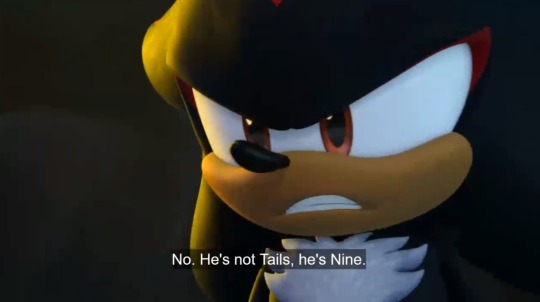

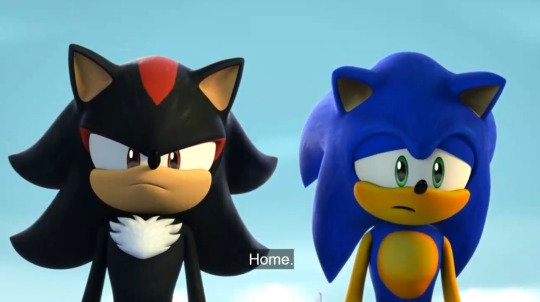

Nine was working towards the goal of building a home—a new home for he and Sonic to be together in the Grim. (After all, he is real, he could care less about anyone that's not Sonic, and he doesn't believe it's even possible to ressurect what he believes to be gone)
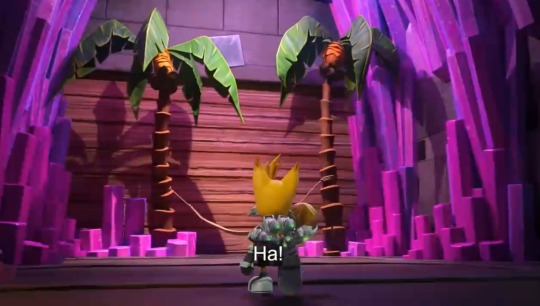
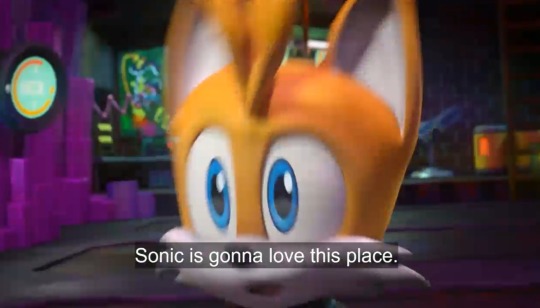
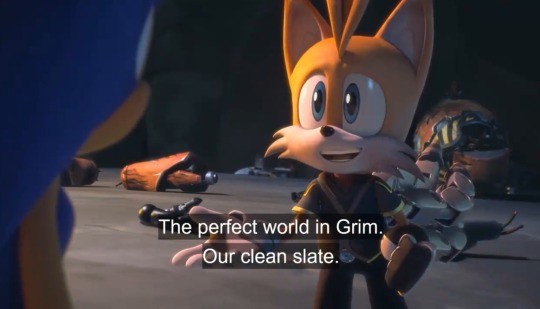
And Sonic was working towards the goal of restoring Green Hill and bringing back his friends while the shatterverse yet exists.
Yes, you heard me right.
Sure, way back in season one his goal was just to make everything "normal" again, and in a way that’s still true (it's just his definition of normal has shifted from "everything should be exactly how it was" to "my old friends and home need to exist again"), but his perspectives on the shatterspaces and the new characters are different from how they were back then.
Back in season one he'd considered them just *basically* his old friends shifted to the left or like his old friends were buried inside them. It took him a little while to call them by their own names/titles rather than referring to them by the names of his original friends. He'd believed that Thorn would come around to friendship because she was like his Amy deep inside, and that Dread would return to captaining his crew because he had Knuckles' loyalty deep inside him.
But we begin to see this shift in real time, and the proof of it all is something Sonic tells Shadow in their first conversation about Nine.
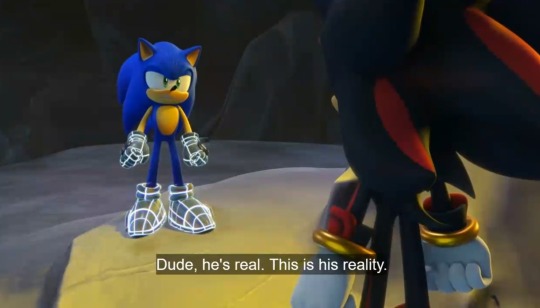
Nine is real to him. They're all real.
And if Sonic didn't think they weren't, he would not have pushed Nine to take him back to New Yolk so he could save Renegade and Rebel and the people from being killed/beaten down. If they weren't growing on him, if he didn't still want them around, he would not have admitted that he wants Nine to meet Tails (or any of his original friends)
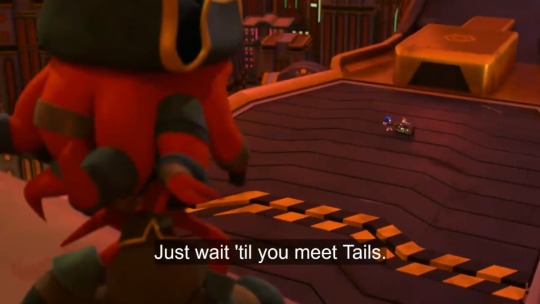
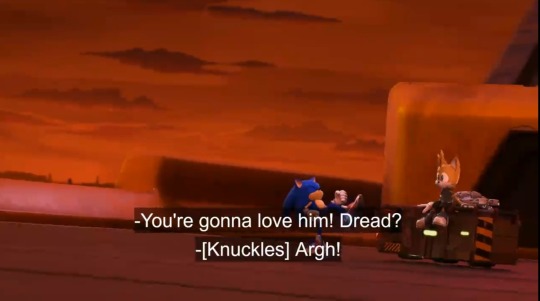
But again, full character analysis (even that of Sonic) is best left for another post (so I don't go off on too many tangents). So, I'll make my point.
I think Shadow and Nine each represent two opposing goals/outcomes (the outcome where everything reverts back to how it was originally versus the outcome where everything continues as is and Sonic has to move on) while Sonic is stuck between them (no longer quite as willing to erase all of his new friends and their realities, despite how desperately he wishes to have his home and original friends back). And what this framework (of Sonic being stuck between two different theoretical outcomes and ideology (whether he should try to get everything back just how it was or move on and start anew, possibly even forgetting what was before)) seems to lead up to is Sonic's inevitable choice.
Our original choice of Option 1 and Option 2. Will Sonic choose to restore everything to as it was before, or will Sonic choose to keep everything as is?
And yes, some people think he's already made his choice (whether he's come to terms with the possible fact that he may have to sacrifice one for the other is irrelevant). Some people are already planning the funerals of our new characters as Sonic can't bear to choose anything over his old home and friends.
But...really. Who says he has to make that choice? Is choosing between reverting everything "back to normal" or moving on as if his friends/home are dead and gone really his only choice, or is it what the characters (and some of us by extension) have just assumed?
ㅤ
Let's go back to earlier Season 2.
While Season 1 primarily focuses on Sonic trying and failing to collect the Paradox Prism shards in hopes it might fix something, Season 2's focus (aided by Sonic now making acquaintances out of the once strangers of the shatterspaces) is primarily Sonic's race against the Chaos Council to gathering and assembling all five shards (so Sonic can restore his home and friends and thwart the council's plan to conquer the shatterverse).
But while in Season 1 Sonic's attempts to gather the shards often fail once he accidentally touches a shard,
In Season 2 Sonic's attempts fail because of the conscious choice he makes to protect his new friends over making off with the shards.
Season 2 Episode 2. "Battle in the Boscage". Sonic takes the Boscage shard in hopes of luring the Chaos Council and their eggforcers away from Thorn, Prim, and the Boscage gang, allowing their lives to be spared as he takes off with the shard. Not long after he begins running, Dr. Babble throws a tantrum, throwing around his own eggforcers as he continues to fight the Boscage gang and topple trees. Seeing that the council did not follow him, Sonic is given the choice to keep running and make it out with the prism without trouble, or to save his new friends. Upon choosing to come back for the Boscage gang, he saves them at the cost of the council stealing the Boscage shard from him.
Season 2 Episode 4. "No Way Out". Sonic and Dread (in the midst of the 3 way battle between Dread's crew, Sonic, and the Chaos Council) begin a one on one fight over the shard. Sonic, who sees Rusty Rose about to be ambushed by an eggforcer, gives up taking the shard from Dread in favor of saving her life instead.
And then again in Season 2 Episode 4 "No Way Out". The Chaos Council, who has Sonic surrounded, gives him an ultimatum. The lives of his friends, or the No Place shard.
But the other two examples mostly stand to show off to the audience Sonic's morals and that he cares about the wellbeing of his new friends (and are more subtle about it being a choice, given that in Boscage he didn't assume saving the gang would result in him losing the shard, and earlier in s2 ep4 he had technically gambled on still being able to get the shard back despite his choice). This choice is much more clear and on a grander scale. Mr. Dr. Eggman outright says "Hand over the shard, or say goodbye to your friends forever". This is not just a choice in the heat of the moment. This is "the shard, or the lives of your friends".
And this scene of "give us the ultimate power we want and we'll spare your friends" too is not an uncommon scene in media (the season finale of mlp fim s4 does come to mind here).
Except, once again, despite the numerous examples for the writing team to draw on, there is again an "inconsistency".
Because Sonic *doesn't* make a choice within the framework the council gives him. Unlike in the earlier examples, unlike in similar choices in media, the story does not go down the route of Sonic willingly and easily giving up the shard as some of his friends yell "No!"
Batten makes clear her stance that Sonic should hand the shard over for their lives, Rusty makes her stance clear that her life is expendable if it keeps the Chaos Council from taking over everything, and Nine motions at him to keep gathering the shards as in the plan, to not give it over.
And just as everyone thinks Sonic is going to give the shard over, he throws it, and he tells the council to get it themselves if they want it so bad.
Yes, in the end the council ends up with the shard again while Sonic's friends are safe, but he did not yield to the "this or that" choice. He was stuck in the middle of getting the shard (possibly necessary to save his home) or giving the shard to the council (and making his goal of restoring his original friends and home harder), and he took the middle road (a choice which seems to please even Nine).
Taking the middle road allows him more certainty that his friends (save Nine of course) will be saved and allows him to gamble with the possibility of also getting the shard back. It is a choice that gets him closer to what he wants on his own terms.
And the narrative rewards him for making this choice.
Because after choosing to protect his new friends, which are equally as real as the old ones, and choosing to take the middle path he's on rather than succumbing to the "this or that" choice he's been given, so happens season 2 episode 6 "Double Trouble" and episode 7 "Cracking Down".
Sonic is allowed to get all 3 shards (which includs the two he'd lost as a result of his choices) and save Nine, and the two travel with Shadow to ghost hill.
Keep this in mind. What could have been a season long endeavor of plan (or plans) to get the shards back from the council (even after Sonic let them go to protect his friends) became a successful escape plan in which he and Nine stole them away.
ㅤ
So, back to the season 2 finale and beyond.
Just like with Sonic's ultimatum in Season 2 Episode 4 "No Way Out", Sonic is idealogically placed between Shadow (who is distrustful of Nine and assumes Sonic is trying to revert everything to as it was before with him) and Nine (who doesn't share Shadow's goal and assumes Sonic is on board with his goal to turn The Grim into a new home for the both of them).
(Perhaps Sonic, Shadow, and Nine's problems with assuming one of the other is on the same page as them would be another good essay topic, or perhaps it would function as a small piece of the analysis topic on why Season 2 ends the way it does)
But Sonic...doesn't get to make a choice. The shard is almost finished, but it’s incomplete still, and Nine takes it with him. Shadow isn't even in the room to exert his opinion as before. The scene is well, frankly, filled with miscommunication on the same scale as Nine and Sonic's first conversation in the Grim, because they both get something different out of it.
But I want to make my view clear. Sonic is still fundamentally in the middle of the two goals I mentioned. He is *still* stuck between Shadow and Nine (the difference is just that Nine thinks Sonic shares Shadow's goals, and Shadow most likely thinks Sonic shares Shadow's goals, and Sonic just...wants everything to work out fine for everyone). And I think Sonic will eventually be raised the outright choice or ultimatum (or at the very least, these assumed outcomes will come back for him to wonder over).
In Season 3, we will most likely see major parties fighting over the paradox prism (the council, Nine, etc).
I believe it's possible that Nine (because he's more attached to Sonic possibly than he even believes, and because he'd *still* made plans with Sonic after S1, even after he had every right to feel left behind and betrayed by him) may attempt to use this power not only to transform the Grim into his home, but to bring Sonic to his side. Likewise, as with the miscommunication that began Sonic and Shadow's fight in S2 Ep1 in Ghost Hill, I think it's possible we could see a similar fallout from the s2 finale with Sonic and Shadow (because I believe Sonic will make it clear that he believes his new friends' lives can be preserved), and I can see Shadow also trying to get Sonic to take his side (because he doesn't understand what there is to be attached to).
And I think when Sonic is raised this ultimatum (save Nine and the shatterverse or save Green Hill and his original friends), I think he will make his own choice.
The idea that he even *has* to make one of those two choices is a red herring.
For what other than speculation suggests there is no middle road?
I mean, the fact that for a moment Ghost Hill becomes Green Hill, Sonic's old friends begin to exist in the shatterverse while the Chaos Council and Nine work unperturbed show us that perhaps Sonic *can* have his cake and eat it too.
ㅤ
Tl;dr: Sonic Prime isn't a typical multiverse x shattered universe story. The narrative is building up to an eventual choice Sonic will seemingly have to make between his old reality and his new reality as it pits him between Shadow and Nine's respective goals. However, the choice itself is a red herring, as I believe Sonic will make a choice on his own terms (the choice to allow his old friends and home to coexist with his new friends and their homes). I think this story can plausibly end with an "everybody lives" ending.
Thank you for coming to my Ted Talk.
#nine sonic prime#shadow the hedgehog#miles nine prower#sonic the hedgehog#sonic prime#sonic prime meta#(hope that tag is applicable)#sonic prime analysis#sonic prime theory#sonic prime season 2#sonic prime season 2 spoilers#There we go. I'm glad to finally get some of that thought out there#smartzelda#smartz essays#(that'll be my new essay/analysis tag I think)#For the record I also think there are plenty of things to come in the future for Prime. I mean...the void? The presence of the green chaos#emerald and the absense of any since Shadow dropped the green one into the void?#The existence of those 'inconsistencies' I mentioned and whether this will be touched upon in the story? Even down to the possible#consequences Sonic might end up with for being a store for all that prism energy (and with his unique connection to the paradox prism/shards#)?#There's so much I'm so excited#Anyhow see you all the next time I can't take it anymore and just have to get my thoughts out#(perhaps on one of those other Sonic Prime essay topics?)
48 notes
·
View notes